

Oceania: Archbishop’s address to Eucharistic Congress Page 4
Books: Oscar Wilde and his exjailbird biographer? Page 14



Oceania: Archbishop’s address to Eucharistic Congress Page 4
Books: Oscar Wilde and his exjailbird biographer? Page 14
With the conclusion of the federal election it is now opportune to have a sensible and compassionate debate over the abortion rate in Australia, says the country’s largest single ownership grouping of non government health services.
‘Even though it is controversial and complex, it is high time that the issue of access to abortion be properly discussed at a meeting of the country’s health ministers,’ Catholic Health Australia’s CEO Francis Sullivan said on November 1.
Mr Sullivan’s comments came in the wake of remarks by Federal health Minister Tony Abbott that, at approximately 100,000 a year, abortion had become an epidemic in Australia. ‘Our compassion as a community needs to be consistent in our attitude to people in distress or difficulty and in our defence of the unborn and vulnerable,” said Mr Sullivan.
‘Not only are abortions too easily accessed, the community has been lulled into a sense of ignorance over the tragedy of late term abortions. These days we find the stark irony that neo-natal intensive care units save babies of the same age as are being deliberately aborted through the accommodating legal frameworks in the states and territories.’
‘The country’s health ministers should act with a sense of responsibility to uphold the dignity of every life and place on their agenda the establishment of an inquiry into the abortion industry in Australia.
Continued on page 2

■ By Jamie O’Brien
A Bishop who was a close friend and colleague of assasinated Archbishop Oscar Romero visited The Record to talk with staff about the life of his murdered friend last Monday November 1, All Saints Day. Staff from The Record and other
Church agencies this week listened to a talk by Bishop Gregorio Chavez, Auxiliary Bishop of San Salvador in El Salvador.
Bishop Chavez is Director of Caritas for Latin America and a graduate in Social Communications.
Archbishop Romero was murdered in 1980 during an ongoing civil war in El Salvador and is due to be beatified in Rome next year,
An historian goes in to bat for the purpose and justification for the Crusades Pages 7-9
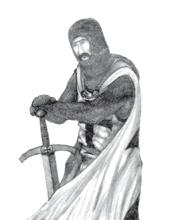
Bishop Chavez said. Speaking in Spanish, Bishop Chavez’s talk was translated by Br Oscar Augilera from the Servite Friary. Bishop Chavez said that Archbishop Romero is a special martyr because he was not killed by communists or by Nazis but by “people that profess themselves as Christians.”
The Bishop also emphasised his concern at globalisation’s negative
effects on South America and the world, mostly at the expense of increasing poverty.
“These models of economy exclude people increasing the line of poverty,” he said. “All of this is a challenge for us in the evangelisation.”
A more detailed account of the Bishop’s talk will appear in The Record next week.
WA’s Catholic Education authorities have received numerous inquiries from the public following the announcement of the Health Care Card tuition fee discount in midOctober.
More than 190 calls to the specially-established information line and further inquiries via the Internet indicated encouragement and a positive response to the scheme, said CEO Director Ron Dullard this week.
The initiative is to be introduced next year and will apply to all students who have a Health Care Card (HCC) for means-tested reasons. Holders of a Pensioner Concession Card (PCC) are not currently eligible for the scheme.
At the time of presenting the proposal, the means-testing arrangements undertaken by Centrelink in order for someone to access a PCC were too varied.
Some PCC holders can earn up to $57,000 a year. With a PCC, there is also the question of who holds the PCC versus who is responsible for the payment of school fees in the case of a family break-up.
PCCs are also valid for 12 months, unlike HCCs which better reflect changing circumstances by being valid for shorter periods.
Continued on Page 2
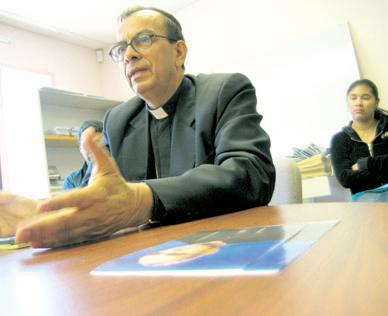
An artist suffering a debilitating disease that’s getting worse refuses to give up Page
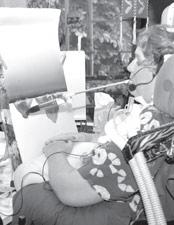
DISTRIBUTION
The Record, established in 1874, is distributed to Catholic Churches, presbyteries, religious houses and subscribers throughout the Archdiocese of Perth, Geraldton, Bunbury, Broome and overseas.
THE TEAM
Managing Editor Peter Rosengren
Production/ Advertising Carole McMillen
Office Manager Kylie Waddell
JOURNALISTS
Bronwen Clune
Jamie O’Brien
CONTRIBUTORS
Hugh Ryan, Paul Gray, Fr Tim Deeter, Tony Evans, George Russo, Peter Dwan, Guy Crouchback
SUBSCRIPTIONS
Subscribe to The Record (46 issues) and Discovery (6 issues)
$55 per year. Send cheque or money order.
ADVERTISING
Editorial: Tuesday first mail
Advertising:
Booking: Monday
midday
Copy: Tuesday midday
CONTACT US 587 Newcastle Street,
Perth, WA 6005 PO Box 75,
WA 6902
Tel. 9227 7080
9227 7087
Editor cathrec@iinet. net.au
Classifieds/ Advertising advertising@ therecord.com.au Accounts administration@ therecord.com.au



Dayspring Centre for Christian Spirituality and Counselling Inc.
Graduate Diploma in Spiritual Direction
First time offered in 2005 - training for Spiritual Directors (applications close 26th Nov 2004)
The Dayspring community offers courses designed to empower and equip you to develop a deep and transforming inner life. Also offeredCertificate II in Christian Spirituality and Diploma in Spirituality for Ministry
The heart of the program is contemplative, emphasizing the importance of spiritual study, discernment, and prayer.
All qualifications are accredited through ACAS.
Contact our office to receive the Handbook 2005
Tel: 9275 3773 – Email: info@dayspring.org.au
General: That Christian men and
God’s call to strive for holiness of life.
Missionary: That all those who work in the missions will never forget that personal holiness and intimate union with Christ are the source of the efficacy of evangelisation.

Continued from page 1
Amongst other things this inquiry should investigate
■ The commercial and financial arrangements underpinning the practice of abortion in Australia;
■ The rate of abortion with particular reference to the rate of late term abortions;
■ The long term impacts for women and men affected through the procurement of abortions;
■ The role of education, counselling and social support services on the rate of abortion; and
■ The availability of support and practical options for people to have and adopt children.
Mr Sullivan said CHA will be writing to all ministers requesting they place abortion on their next joint meeting.
Meanwhile, a recently-established Christian political lobby group based in Canberra called for sensitivity and compassion in dealing with the abortion debate.
“The welfare and best interests of both child and mother need
to be considered here,” said Jim Wallace, executive chairman of the Canberra-based Australian Christian Lobby.
“At the moment too many decisions are made on the basis of ‘I can’t afford the child’.”
The ACL was established in 2001 to support Christian politicians in all political parties and to lobby on issues of importance and concern to Christians generally.
“With John Anderson, Tony Abbott and Christopher Pyne all championing a revision of our attitudes to the abortion industry in Australia, we need to look more carefully at both sides of the equation,” he said.
“Federal and State Governments should work together to increase the role and funding for support services to help women to bring the child to full term,” said Mr Wallace. “There is a clear role for the Church, charities and other community based organizations to help support struggling mothers during these difficult circumstances.”
Dr Weller of the Pregnancy
Advisory Centre reaffirms that a woman who makes the "extremely difficult" decision to abort a healthy fetus is experiencing some crisis in her life. (The Australian, 2/11) “Government needs to prevent this crisis, not cause it by funding what has clearly become the conditioned response of an abortion,” said Mr Wallace.
“Mothers and families are in need of support. It seems ludicrous for the Government to allow abortion rates to rise rather than getting behind charities and community groups with a mind to help. Community based organizations can respond to mothers individually with sensitivity and compassion.”
“For a mother to make an informed decision to take the baby to term should be considered a positive step. If she doesn’t want to keep the child after the birth, there are more than enough childless couples willing to provide a loving home.”
A small Cistercian monastic community in the US has become an unexpected supplier of information technology and is on course to turnover US $2.5 million in sales of its products just two years after getting into the business.
A thousand years ago, monks spent their days copying manuscripts, illuminating Bibles and spreading knowledge both sacred and secular.
So why, Cistercian Father Bernard McCoy wonders, does it come as any surprise that his small abbey in Wisconsin is supporting itself and its good works by engaging in the enterprise of the information age?
Father McCoy, 37, led his brother monks to start Lasermonks.com two years ago as the community looked for a new way to raise money.
"What a lot of people don't get is that abbeys - Benedictines and Cistercians - have to support themselves, so they're not just living off donations," he said.
Lasermonks offers toner and inkjet cartridges for printers; the cartridges are brand name, manufactured by third parties or refurbished. They are sold at a significant saving over retail stores.
Traditionally, monks have used agriculture, or marketed products such as jams, jellies and fruitcakes. More recently, some monasteries have begun producing and selling caskets, with Trappist Caskets being perhaps the best known.
Other monastic communities have begun to act as distributors.
The Cistercian Abbey of Our Lady of Spring Bank had moved from its previous location in 1984, Father McCoy said. After they settled in ideas for raising money ranged from growing shiitake mushrooms to operating a conference centre and golf course. As Father McCoy, the abbey's steward of temporal affairs, investigated the options, he spent a lot of time at his computer, and ran a lot of
things through his laser printer. But when it came time to order more toner, he was shocked at the price. "It seemed like an awful lot of money for a little black dust," he said. He thought the monks could find a way to provide the products for less. And with the creation of Lasermonks.com, a for-profit company owned by the monastery, they have.
"An income project that was based on a necessary consumable item, like toner and ink cartridges, was exactly what the monastery needed - a solid, consistent income that would not be affected by difficult economic times," Father McCoy said. "We offer something people would need to buy anyway, at a lower cost, and they support good works. And we offer a unique perk - the monks will pray for you."
Of course, no purchase is necessary for prayer requests.
Editor's Note: More information is available on the Internet at: www.lasermonks.com.



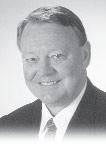
Continued from page 1
As a consequence of the difficulty in assessing the financial circumstances of those with PCC, the holders were not automatically included for a discount but could be assisted under existing arrangements, by approaching the school.
Mr Dullard said this appears to be the most appropriate way of assessing this group.
West Australian parishes showed a huge amount of support for the liturgical launch of Archbishop Hickey’s Lifelink Appeal last Wednesday October 27.
Auxiliary Bishop Don Sproxton commissioned more than 70 parish-based Lifelink representatives for the archdiocese.
This year the aim is to raise $350,000.
“This is the only appeal conducted in the parishes each year,” said Brett Mendez from Lifelink.
“We greatly appreciate the parish and parishioners’ support.”
The representatives will take care of speaking in the parishes to promote the appeal in time for Christmas, as well as putting up
posters and garnering support for the appeal generally.
This weekend, a letter from Archbishop Barry Hickey urging support for Lifelink’s fundraising will be distributed, while on the weekend of 13-14 November a collection will be taken up throughout the archdiocese.
In his address for the launch, Bishop Sproxton spoke of the
recently deceased American Cardinal James Hickey who said ‘we don’t help people in need because they’re Catholic, we help them because we’re Catholic.’
“Cardinal Hickey said that if we don’t reach out to people who are homeless, those who are isolated and those who are abused, then how can we possibly call ourselves the Church of Jesus
Christ,” Bishop Sproxton said.
“Everyone needs to experience the mercy and compassion of Christ through Christians.” The Bishop also told a story of two young men from South Korea who benefited from the services of Lifelink agencies and how they had gone on to open their own business. A prayer card was also distributed.
“Who will speak if we don’t?” were the words that echoed from the Sts. John and Paul Church in Willetton at the conclusion of The Archdiocesan Mission Mass on October 27.
Students from 51 schools gathered from all corners of Perth to celebrate Children’s Mission Day at a Mass concelebrated by Bishop Don Sproxton and 13 priests from seven different nationalities.
In an annual event coordinated by the Catholic Mission Office in Perth, the day is an integral part of the Church’s World Mission week.
The gathering reminded all in attendance that as Catholics they are called to both celebrate and practise the missionary spirit that has been given to them by Christ.
The Gospel reading was taken from Matthew 25 when Jesus told His Disciples that when they gave something to eat and drink to a stranger or clothed or visited them, then they were doing the same to Him.
This was followed by a Homily from Fr. John Daly who spent several years working with Mother Teresa’s Missionaries of Charity

in Calcutta. From the squirming in the pews as he described treating the maggot-infested head
wound of a young boy students seemed to understand that the message of reaching out to others
The
seeking an enthusiastic staff member to be responsible for the overall Cashier/Teller function of the Catholic Development Fund. This fund, which provides financial products and services to a wide range of customers, is an integral part of the Diocese Specifically, the position will attend to customers everyday banking needs by processing deposits, withdrawals, electronic payments, transfers and other functions such as maintaining customers account details and daily reconciliations.
The successful applicant will have experience in retail banking or a similar field. Working as part of a small successful team you will have excellent numerical, communication and interpersonal skills, a high level of energy and motivation and a demonstrated working knowledge of Microsoft Office products. Applicants should be supportive of the ethos of the Catholic Church.
Applications including covering letter, curriculum vitae and references will be treated in strictest confidence and can be emailed to Peter Wheeler, Fund Manager at peterw@bunburycatholic.org.au.
Applications close Friday 12th November 2004.

Catholic Diocese of Bunbury, PO Box 2005 Bunbury WA 6231 www.bunburycatholic.org.au

is not always easy. Many schools contributed to the Liturgy including refugee children from El Salvador, Iraq and Sudan. The enthusiastic participation of the students was appreciated by those in attendance. Francesca Lawrence from Community Support for Refugees described it as the most moving ceremony she seen in 60 years. Bishop Sproxton thanked all those involved for their participation and encouraged their continued prayer and generosity towards those less privileged. After Mass all schools were presented with a ”showbag” including Eucharistic fridge magnets and bumper stickers as well as
copies of the Catholic Mission Office newsletter “Mission: Possible” to inspire them with stories of missionary works from around the world.
The Director of the Catholic Mission Office, Francis Leong, said the annual event was growing each year and the involvement of a Muslim family this year reflected the Pope’s call for interfaith dialogue.
Mr. Leong said that the flag ceremony at the beginning of Mass symbolised the Catholic Mission Outreach to 160 countries from South America to Pacific Asia to Africa and the Aboriginal people in Northern Australia.
- Mark Reidy
Pre-pay your funeral with an Oakwood Guardian Plan and secure your family’s peace of mind. Guaranteed.
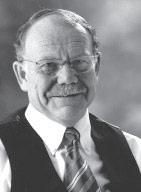
Using Oakwood Funerals’ Guardian Plan to pre–arrange your funeral frees your family from worry at the one time they can least afford to worry. It also means your wishes are carried out to a T. And, because the Guardian Plan is a nationally accredited funeral fund, you are guaranteed that the cost of
make
Perth's Archbishop Barry Hickey received a rousing reception when he welcomed delegates from Oceania and spoke for them at the 48th International Eucharistic Congress in Guadalajara, Mexico on October 11. His address is published below.
It is my privilege to welcome to this 48th Eucharistic Congress the many delegates from Oceania who have come here on pilgrimage to participate in this celebration which will deepen their faith in the Blessed Eucharist, affirm their communion with the universal Church and inspire them to take Christ's message of love to the world.
The peoples of Oceania
Oceania is geographically large consisting of many countries bound together by the mighty Pacific Ocean. Hence its name, Oceania. The area includes some large countries like Australia and New Guinea, and many small countries and islands scattered over a vast area of water. Hundreds of languages are spoken by the peoples of Oceania, representing a bewildering number of cultures, both traditional and modern.
In Oceania the cultural patterns and traditions of original populations have been influenced, in some places very profoundly influenced by successive waves of people from Europe and other countries. In Oceania the old exists with the new, the traditional with the modern, subsistence economies of fishing and hunting with technological economies of the First World.
Into this complex situation the Gospel of Jesus Christ has been brought by brave missionaries and has flourished in rich soil.
It is not just the vast waters of the Pacific Ocean that bind us together but our common faith in Jesus Christ. It is this faith that we share as brothers and sisters that brings us here today to proclaim our deep love for our Saviour, Jesus Christ, present to us as our Eucharistic Lord.
We continue to be inspired by the central theme of the Synod of Oceania held in Rome in 1998, to Walk his Way, to Tell his Truth and to Live his Life.
It is in walking the way of Christ, in telling his truth and in living his life that we make the Gospel come alive in our diverse cultures. We are not simply on the receiving end of missionary efforts. We have pledged ourselves to be missionaries too, to enter fully into the new evangelisation, in solidarity with the Holy Father.
To quote from the Synod of Oceania - "The Church in Oceania received the Gospel from previous generations of Christians and from missionaries coming from overseas.... As the peoples of Oceania came to accept the fullness of Redemption in Christ, they found a striking symbol in the night skies, where the Southern Cross stands as a luminous sign of God's overarching grace and blessing.
The present generation of Christians is called and sent now to accomplish a new evangelisation among the peoples of Oceania, a fresh proclamation of the enduring truth evoked by the Symbol of

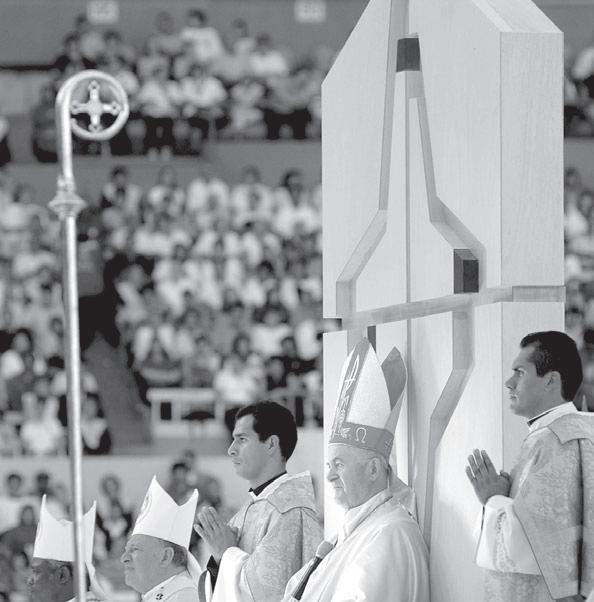
the Southern Cross. (No 13). From the beginning of the evangelization of the countries of Oceania, the Blessed Eucharist, especially the Holy Mass, has been central to the life of the Church.
One has only to think of the sacrifices people made to travel long distances to attend Mass in the days when priests were few, to recognize the importance of the Mass in the lives of the peo-


of the people and their formation in prayer and Christian living, looking forward to the eventual return of the priests so they could participate again in the Sacrament that brought them into personal contact with Jesus Christ, their Saviour, their Shepherd and their spiritual nourishment.
With the development of the Church priests became more plentiful and the communities flour-
of our forefathers is not as strong in more recent generations. This has given rise to considerable concern and demands a vigorous response in terms of the new evangelisation. The fallaway of Mass attendance has occurred in all age groups, but especially among young people, many of whom have not had strong parental encouragement in matters of faith nor strong catechetical instruction. Our surveys
Serving others in love is one of the most precious fruits of the Eucharist. If Jesus seeks to draw us into a deep communion with himself, he also wants the whole of mankind to be one with him. It is up to us to manifest his love for all peoples and to strengthen the ties of brotherhood. We cannot therefore be indifferent to the sufferings of those who are our brothers and sisters in Christ
ple. In the early beginnings of Australia, when the Faith was often very strong among the early convicts transported to the colony, demands were constantly made to the colonial authorities to provide a Catholic priest to minister to them. When priests eventually came, they said Mass in prisons and in work camps on improvised altars, and were welcomed with tears by people who had hungered for the Bread of Life for a long time.
Missionaries travelled constantly throughout the islands of Oceania forming Christian communities and saying Mass for them. They left behind people they called catechists to continue the instruction
ished with Churches, Religious Congregations, Catechists and Religious Educators, schools and works of charities.
Shadows
If there is a shadow over the present situation it is that some countries like Australia and New Zealand are strongly influenced by a form of modem secularity that seeks to undermine what has been built up over many years, particularly attendance at Sunday Mass, eucharistic devotion and vocations to the priesthood and Religious Life.
Recent surveys have confirmed our experience that the strong faith
of nominal Catholics. Nevertheless the numbers of those presenting themselves for the priesthood vary significantly among and within Oceanic countries. In some places there are already welcome signs of a revival. The lack of priests in some areas has meant that smaller communities do not have Mass every Sunday.
The Synod of Oceania was very conscious of the effect of fewer priests on access to the Sacraments, particularly to the Eucharist. The Holy Father in his Post-Synodal Exhortation said "I make my own the Synod's insistence that greater efforts be made to awaken vocations to the priestly life, and to allocate priests throughout the region in a more equitable way" (No 40).
In his Letter to Priests on Holy Thursday of this year the Holy Father said "There can be no Eucharist without the priesthood, just as there can be no priesthood without the Eucharist". We look to the future with confidence that our prayers for vocations will be answered.
These shadows should not give rise to any sense of powerlessness in the face of creeping secularism. The same promises that Jesus made about the Eucharist are promises that will attract the modern heart as strongly as the people of past ages. "Anyone who eats my flesh and drinks my blood," he said "will have eternal life". (Jn 6,55).
"Whoever eats my flesh and drinks my blood abides in me and I in him .... Whoever eats me will live because of me." (Jn 6, 56, 58). A world hungry for spiritual nourishment and the voice of love will be as attracted to Christ's words. We should not doubt that what we must do is offer the world the Bread of Life and offer our personal witness of a life transformed by our Eucharistic Lord.
Lights
If we have spoken of the shadows we must also speak of the lights, and there are many.
Despite the decline in numbers, those who are faithful are being drawn closer and closer to God through the Blessed Eucharist and coming to understand how the Eucharist can affect their daily lives.
have found, alarmingly but not surprisingly, a diminution of belief in the Real Presence of Jesus in the Eucharist and a poor appreciation of Sunday as the Day of the Lord. Various factors have caused a drop in vocations to the priesthood in the larger countries of Oceania, in Australia and New Zealand in particular. The secularity of society is a major factor in the paucity of vocations but not the only one. One must also consider the effect of small families, the opportunities for study and advancement and the perceived role and life of priests, as well as the diminished cohesiveness of the Catholic community and the greater numbers
The numbers of those attending daily Mass is steadily growing in many parts of Oceania. In the quiet hours of the morning both young and old find their way into Church, seeking the quiet of daily Mass for contemplation and communion with Jesus in the Eucharist.
Whereas Sunday Mass is a joyful community celebration with good music that lifts the heart and willing participation by the people in the Liturgical Action, daily Mass has a different character, a silence and a spirit of interiority that is treasured. It is especially in those occasions that a deep awareness of the real Presence of Jesus in the Blessed Eucharist is fostered. This leads to visits and adoration of the
The ancient Christian churches of Syria, small in numbers but vibrant in faith, are facing new challenges brought by political instability and religious extremism outside the country's borders.
The war in Iraq has unleashed violence and terrorism by groups claiming to act in the name of Islam, sending tens of thousands of Iraqi Christians - along with many Muslims - fleeing into Syria.
Although the Syrian government has steered a moderate course and clamped down on any form of fanaticism, the percolation of Islamic fundamentalism throughout the Middle East worries Christians in Syria.
Internally, the churches also face a major demographic problem, as many of their younger members continue to emigrate to places of prosperity and security abroad. Syria's Christian community has shrunk in recent years to about 10 per cent of the population.
Despite these problems, most Syrian pastors and lay faithful speak hopefully about their churches' future in a country that has taken pains to protect their religious rights.
"I think we can be optimistic.
Christians have been here for many centuries and are generally well seen by our Muslim brothers. There can be no 'clash of cultures' because we share the same culture," Armenian Orthodox Bishop Shahan Sarkisian of Aleppo said in an interview in late October.
Catholic leaders echoed that sentiment.
"When you look at the fundamentalism outside of Syria, I wonder if this government could become a tool to help stop it. Perhaps Syria could become a model for other countries," said Melkite Archbishop JeanClement Jeanbart of Aleppo.
Syrian Christians and Muslims categorically reject the accusation made by the Bush administration that Syria supports terrorism. The topic often provokes an animated response.
"I read that Syria is on the list of countries supporting terrorism. Can you imagine such a

thing? This is not true at all," said Melkite Patriarch Gregoire III Laham of Damascus.
Most Syrians say the terrorism accusation is simply US politics.
They say Syria's ruling Baath Party, which maintains total political control, would never allow Islamic militancy to sprout here.
And as one Christian in Aleppo put it, the Syrian government is "too smart" to get into a showdown with the United States.
But the arrival of so many Iraqi refugees is a daily reminder of how quickly things can change.
As in Syria, Iraq's Baath regime ruled over a secular state, and the Christian minority was well protected. Now, many of them are fleeing for their lives from religious persecution in Iraq.
"The Americans came and now the whole country has been opened up to fighting. Every border is open, anyone can come in. Fundamentalist Muslims are flowing into the country," said one Iraqi Christian woman who arrived with her family in Aleppo in October.
Syria's Muslim leaders are among the most vigilant against extremist manifestations of Islam. Sheik Salah Kuftaro, who runs a highly influential Islamic foundation and school in Damascus, said in an interview that Syrian
society is currently "free from the seeds of terrorism and extremism," and he predicted it would remain that way. His father, the late Syrian Grand Mufti Ahmad Kuftaro, welcomed Pope John Paul II on his historic visit to the Umayyad mosque in 2001.
The younger Kuftaro said one guarantee of continuing religious tolerance in Syria is that his father trained hundreds of Islamic teachers who will follow his example. One of them was recently named by the government to head the Ministry of Religious Affairs, he said.
"So we have good hopes to be able to deal with any form of extremism that may arise," he said.
Syria's bishops also make frequent speaking appearances at Islamic meetings to preach tolerance and dialogue. Melkite Archbishop Isidore Battikha of Damascus recently found himself cheered by a Muslim audience when he declared that Christians must never be labeled "infidels."
"I see no serious clouds on our horizon. On the other hand, Syria is a nation of young people, and young people are easily influenced. My concern is that outside forces don't end up influencing our Muslim youth," Archbishop Battikha said. What appears to
Auxiliary
BishopDon Sproxton recently instituted more than 120 men to the service of acolyte after a three-year interval during which no acolytes were instituted.
The men came from 45 parishes and were taken through a fourweek course one night a week with Fathers Pat Cunningham, Vincent Glynn and Peter Bianchini; and Sisters Kerry Willison, and Marie Therese Rider.
After completing the course, each candidate made a personal application to Archbishop Hickey
to be accepted in the role. Fr Cunningham said normally institutions to the service of acolyte occur every two years.
Institutions to what is termed the acolytate have been carried out in the Archdiocese since 1974.
According to Fr Cunningham the role of the acolyte has shifted over time.
“The emphasis has shifted from the acolyte as the special minister of communion to a wider appreciation of his role as servant at the altar,” Fr Cunningham said.
In 1986 and 1987 special min-
isters of the Eucharist were introduced, taking over a role that had previoously been carried out by acolytes.
Fr Cunningham said the number of acolytes instituted on this occasion is quite steady.
“This year the candidates were asked to spend at least three months as senior altar servers so that they could make a better decision,” Fr Cunningham said.
“This way they were able to make a more informed decision as to wether they wished to be instituted in a permanent ministry.”
Syria was the land of the apostles, where St. Paul had his conversion, where some of the first Christian writers and theologians lived and where important monastic, liturgical and theological traditions grew up.
That tradition survives in the 11 main church groupings, including the Melkite, Syrian, Maronite, Chaldean, Armenian and Latin rites of the Catholic Church, that form the Christian community in Syria today. Church leaders and ordinary faithful cooperate ecumenically; two "shared" Catholic-Orthodox churches have been built in recent years, and it is not unusual for members of one church to attend Sunday services of a different rite.
Weekly liturgical attendance in Syria is very high, according to all the churches. Many young people return during the week for catechism, charity clubs, Scouts or prayer meetings. One expert estimated that 60 per cent of Syria's Catholic youths belong to some kind of church movement or group.
bother Syrian Christians much more than potential problems with Muslims is that they feel somewhat forgotten in the West. Media portrayals of Syria, they say, typically leave out the country's rich Christian heritage. Few Westerners would guess that Damascus is the Arab capital with the largest number of Christians in the Middle East, they say.
One is 25-year-old Nizar Matta in Damascus, a member of the Fraternity of Holy Mary in his Damascus parish. He and about 100 other young Catholics get together for activities that focus on prayer and service, like helping the handicapped or city cleanup campaigns. There is no strict agenda or regimen.
"We are just trying to live as Jesus taught," Matta said. - CNS
St Kieran Catholic Primary School, Tuart Hill, is a double-stream co-educational school catering for 490 students from K-7. Established in 1920 by the Sisters of Mercy, this multicultural school has the needs of each child as its central focus.
At St Kieran Catholic Primary School there is a strong emphasis on Literacy and Numeracy, as well as a number of specialist programs including Physical Education, Library, Music and LOTE.
The school also operates a Special Education Centre that supports children with extremely high needs. This program is inclusive and operates within the mainstream classroom.
The commencement date for this position is negotiable.
Sacred Heart School is a single stream co-educational school located in Beagle Bay on the Dampier Peninsula, 126 kms north west of Broome.
Established by the Trappist fathers in 1892, Sacred Heart School caters for 130 students from K-10 and is committed to the concept of Two Way Learning with an emphasis on the development of Literacy and Numeracy skills.
The school enjoys strong links with and support from the local community, a relationship that is fostered through the work of the Aboriginal Teaching Assistants.
The commencement date for this position is negotiable.
Applicants need to be actively involved in the Catholic Church and be experienced educators committed to the objectives and ethos of Catholic education. They will have the requisite theological, educational, pastoral and administrative competencies together with an appropriate four year minimum tertiary qualification and will have completed Accreditation B or its equivalent.
A current Police Clearance/100 Point Identification Check must also be included. A Police Clearance Consent Form is available from the Department of Education and Training website (www.eddept.wa.edu.au/ HRRRecruitment/ Downloads/Police Clearance.pdf)
The official application form, Referee Assessment forms and instructions can be accessed on the Catholic Education Office website www.ceo.wa.edu.au
Enquiries regarding the position should be directed to Roma Criddle, Consultant, Leadership Team on 9212 968 or criddle.roma@cathednet. wa.edu.au All applications, on the official form, should reach The Director, Catholic Education Office of WA, PO Box 198, Leederville 6903 no later than Monday 22 November 2004. Website: www.ceo.wa.edu.au
Page 6
Social relationships are warped
he prosecution of a woman on October 27 for leaving two children in a car while she ducked into a shop for a few minutes severely strains the relationship between the State and the citizen. The woman was ordered to do 100 hours of community work, but the maximum penalty for the offence – failing to care for the children – is two years jail or a fine of $8000. Obviously, the maximum penalties relate to serious cases of neglect of children, but the fact that this woman was charged under that law raises serious questions about the relationship between the State and the citizen.According to the facts of the case, the woman parked the car and was in and out of the shop within two minutes. She left the keys in the ignition, a thief stole the car, but drove only about 500 metres before he realised what he had let himself in for, stopped, and handed himself in to police who were visiting a nearby school. The elder of the two boys (aged 6) ran back to the shop and all was well. The offence was created by leaving the children in the car; it was not created by leaving the keys in the car.
The prosecution of this woman is a pompous absurdity that severely strains the relationship between the State and all citizens. Very few of us have not either waited in a car for our parents, or asked our children to wait in the car for us, and most of us have probably had both experiences many times over at different stages of our life. None of us would believe that we were the victim of offences or that we were guilty of offences.
Tel: (08) 9227 7080, Fax: (08) 9227 7087 cathrec@iinet.net.au
Without any warning, the State has now declared that we may all be subject to prosecution for this utterly normal behaviour, and the
Perth Magistrate’s Court has shown that it will accept a guilty plea and impose a significant penalty.
We can all imagine scores of situations in which the declaration of this offence would be farcical; not the least of them would be putting your children in the car while you unload the shopping trolley and return it to its collection point. This involves roughly the same distance and time as in the incident that was prosecuted. Heaven help you if you paused to say hello to a neighbour; you could be looking at a jail term.
It is probably true that it would be more dangerous to have three small children walking across the carpark than to have them sitting in the car, and it is certainly more dangerous to drive them to and from the shops than it is to have them sitting in the car for a few minutes.
The point is that the DPP, the Police, the Magistrate’s Court, and the Parliament that will allow it to go on, have placed the entire population in a position where they cannot tell which of a variety of normal behaviours could be arbitrarily subject to prosecution for failing to take care of children – taking them to a fast food outlet? letting them climb a tree? letting them walk to school? The list is endless.
Of course, no one is likely to be prosecuted for deserting or breaking up their family, or indulging in the sort of behaviour that causes the break up of their family even though this is almost guaranteed to expose children to at least some of a wide range of emotional, intellectual, physical and sexual dangers. It has been known for years, and is confirmed in each year’s statistics, but this sort of information is rarely part of relationships education in schools and it cannot usually be considered in family court deliberations.
The second problem in this prosecution is that the law now requires us to distrust our neighbours. There is no danger in leaving young children in a car briefly; the danger may come from your neighbour. Therefore, you must behave with complete distrtust of your neighbour, and if you do not you may be prosecuted. This is a very serious problem for any society. One does not have to be old – born before or during the 40s and early 50s will do – to remember when it was normal to behave in a trustworthy manner and to trust your neighbour. Most people did not lock their houses or their cars and most people did not know anything about theft from either house or car.
Some people say that Eric Edgar Cooke ruined that in the sixties, but it isn’t so. Cooke may have caused some people to lock their houses, but he did not cause the crime spiral that started in the sixties and has continued ever since.
The real causes are more complex and relate to the collapse of the personal and collective moral sense that bound society together and enabled its members to live in freedom. The collapse was caused by the excesses of the sexual revolution and is fed by the rampant sexuality and aggression that are fed into our homes 24 hours a day in the name of entertainment.
We are not going to be able to lead ourselves out of our present social and moral morass if officialdom and the law declare that basic human respect and trust are offences.


Encounter love
It may be of interest for your readers to note that Pope John Paul’s teaching in “Theology of the Body” reflects much of the lived knowledge and understanding of the sacrament of marriage couples and priests present on each Marriage Encounter weekend. Much of the M.E. understanding of marriage and Church grew out of Vatican 2 teaching. It developed into a worldwide movement in the early days after the Council.
All the weekend presentations have recently undergone a complete revision; concepts and ways of doing things that were no longer relevant were cut out or pruned. A number of the helpful suggestions and development exercises that used to be part of the weekend are now offered afterwards for those who want to come to follow-up sessions. So the weekend is much more focused and allows couples to better learn the concepts and to be better able on the weekend to use the communications skills passed on to them.
Those involved agree that the new form of the weekend is a marvellous improvement. However, since it meant that all presenting teams needed to completely rewrite their talks, there has been an understandable drop off in the number of presenters. Even so we plan three or four weekends for 2005. And with several new couples starting to write the talks, we hope to be able to make the weekend more readily available—and reach out to country areas a bit more.
Fr Pat Rooney Manjimup
Tragedy, period.It is not simply ironic that the great majority of young Catholics have deserted the
4 November 2004
Though I have lived in the United States for over 50 years, my earliest memories are of Wagin, where I lived from 1937 to 1942, as younger son of Frank and Kathleen Cawley, at the Bank of Australasia (opposite the Post Office).
One of my jobs here has been to produce historical pamphlets, and when some of these were recently republished by a Belgian firm, I dedicated that volume to Sister John of the Wagin convent, who first taught me to read and write.
Gratitude to those wonderful Sisters makes me want to do a booklet in their honor.
I asked my old friend, Fr Bernie Dwyer, to write it, but his arthritis is too advanced to hold a pen for long, and so I have decided to do it myself.
I have had excellent input from Sister Patricia Hogan, the Provincial Archivist in Perth, for the Sisters of Our lady of the Missions, and also from my old friends, Ron and Teddy Sheen. I plan to contact some other former pupils too. But could I ask you to publish this letter, and to urge any and all former pupils to send me their memories? I would especially welcome any from the “Bushies,” who used to come in from the farms for religious instruction during the May vacations. My address is: Father Martinus Cawley, ocso, Guadalupe Trappist Abbey, Box 97, Lafayette, Oregon 97127, USA. Our Fax is (USA) 503-852-7748, and my personal phone extension (USA) 503-852-7174, extension 249. My e-mail is martinus@trappistabbey.org And there is a catalogue of my publications on the Web at http://www.trappistabbey.org/translations.html Many thanks, and congratulations on your own excellent Web site.
Church because they feel the Church is irrelevant to their lives. It is a tragedy; a personal and social tragedy involving the loss of a multitude of individuals who have never been taught what it really means to be a Catholic. A faithful Catholic is a pilgrim who forsakes the false values and vanities of contemporary society for the sake of eternal life in Christ. A faithful Catholic understands that it is not possible to live half-heartedly as a Christian.
That does not mean that Christians cannot have a beneficial, and even profound effect on worldly affairs, but to achieve such a result is far from easy and is increasingly difficult. Readers should take to heart The Record’s editorial (21 October) on the true nature of “the clash of cultures going on within our society at the present time” and consider how deeply the Church has become involved in what the Germans called a Kulturkampf: a cultural battle to determine the fate of an entire society.
The Church lost that battle in Germany and the brutal truth is that it is losing the battle for the hearts and minds of Australians. Australia is becoming a pagan nation and many Australians are decidedly antichristian. The attempt to become “relevant” to the world has been a dismal failure.
The Christian Faith is being attacked, as The Record says, by those who seek “to prevent Christian philosophy from being part of the philosophy of our society.” The battle cannot possibly be won if we diminish our faith by misguided attempts to reconcile eternal verities with pagan attitudes.
Hugh Clift Lesmurdie
The intellectualsThe matters Fr Walker mentions are most important but were not, as far as I could see, central to what Mr Gray was saying about ways of countering radical Islamicism and terrorism.
The duty to relieve poverty is imperative upon us all but it is not the poor who make war, terrorism or even revolution, but the Robespierres, the Lenins, the Ulrike Meinhofs and the Osama bin Ladens - the disaffected rich and middle-classes.
My own belief, for what it is worth, is that the best single way to both help the world’s poor and to promote world peace is through trade and free markets, though with proper allowance for the need for public goods, welfare provisions for those excluded from the market, and for certain other special cases.
I am having a book of my own, Steadfast Knight, published by the Fremantle Arts Centre Press in a couple of weeks which inter alia and in another context goes into this argument in more detail.
I don’t think the basics for relieving global poverty and promoting global peace put forward by Adam Smith in The Wealth of Nations more than 200 years ago have been much improved upon since, and I commend that wise book to everyone interested in the question.
Hal Colebatch Nedlands
THURSDAY,


In an interview with ZENIT news agency, US historian Thomas Madden, chair of St Louis University's history department, has defended the purpose and reputation of the medieval Crusaders.
The author of "A Concise History of the Crusades," Madden says that the Crusades were defensive wars, not wars of conquest, and that the Crusaders were a defensive force that did not profit from their ventures by earthly riches or land.
Madden said there were many popular myths about the Crusades, but modern findings prove them wrong.
Myth 1 : The Crusades were wars of unprovoked aggression against a peaceful Muslim world.
This is as wrong as wrong can be. From the time of Mohammed, Muslims had sought to conquer the Christian world. They did a pretty good job of it, too. After a few centuries of steady conquests, Muslim armies had taken all of North Africa, the Middle East, Asia Minor and most of Spain.
In other words, by the end of the 11th century the forces of Islam had captured two-thirds of the Christian world. Palestine, the home of Jesus Christ; Egypt, the birthplace of Christian monasticism; Asia Minor, where St Paul planted the seeds of the first Christian communities -- these were not the periphery of Christianity but its very core.
And the Muslim empires were not finished yet. They continued to press westward toward Constantinople, ultimately passing it and entering Europe itself. As far as unprovoked aggression goes, it was all on the Muslim side. At some point what was left of the Christian world would have to defend itself or simply succumb to Islamic conquest.
Continued on page 8

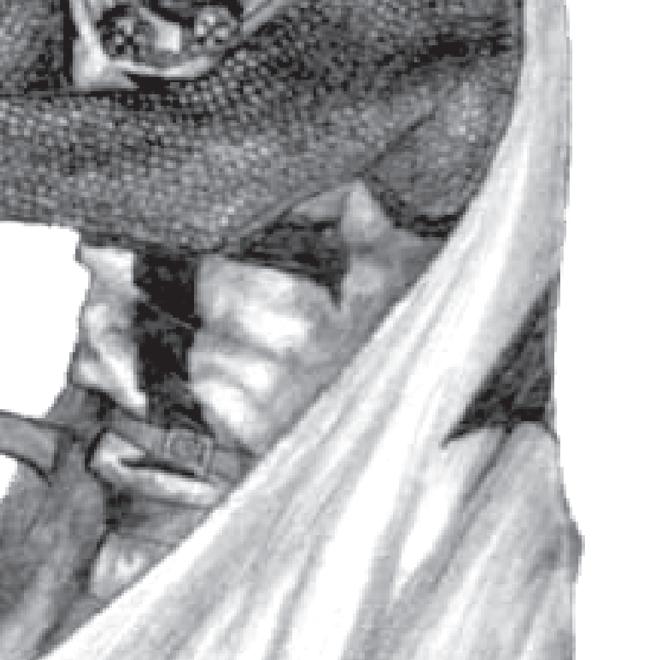

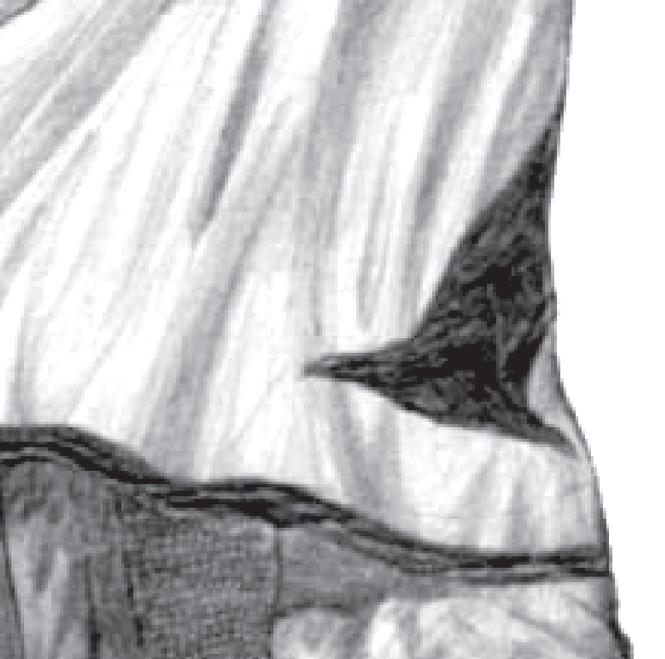




Continued from page 7
Myth 2 The Crusaders wore crosses, but they were really only interested in capturing booty and land. Their pious platitudes were just a cover for rapacious greed.
Historians used to believe that a rise in Europe's population led to a crisis of too many noble "second sons," those who were trained in chivalric warfare but who had no feudal lands to inherit. The Crusades, therefore, were seen as a safety valve, sending these belligerent men far from Europe where they could carve out lands for themselves at someone else's expense.
Modern scholarship, assisted by the advent of computer databases, has exploded this myth. We now know that it was the "first sons" of Europe who answered the Pope's call in 1095, as well as in subsequent Crusades.
Crusading was an enormously expensive operation. Lords were forced to sell off or mortgage their lands to gather the necessary funds. Most were also not interested in an overseas kingdom. Much like a soldier today, the medieval Crusader was proud to do his duty but longed to return home.
After the spectacular successes of the First Crusade, with Jerusalem and much of Palestine in Crusader hands, virtually all of the Crusaders went home. Only a tiny handful remained behind to consolidate and govern the newly won territories.
Booty was also scarce. In fact, although Crusaders no doubt dreamed of vast wealth in opulent Eastern cities, virtually none of them recouped their expenses. But money and land were not the reasons that they went on Crusade in the first place. They went to
atone for their sins and to win salvation by doing good works in a faraway land. They underwent such expense and hardship because they believed that by coming to the aid of their Christian brothers and sisters in the East they were storing up treasure where rust and moth cannot corrupt.
It is important to remember that in the Middle Ages the West was not a powerful, dominant culture venturing into a primitive or backward region. It was the Muslim East that was powerful, wealthy and opulent.
Europe was the Third World.
They were very mindful of Christ's exhortation that he who will not take up his cross is not worthy of Christ. They also remembered that "Greater love hath no man than this, to lay down his life for his friends."
Myth 3 : When the Crusaders captured Jerusalem in 1099 they massacred every man, woman and child in the city until the streets ran ankle deep with the blood.
This is a favourite used to demonstrate the evil nature of the Crusades. It is certainly true that many people in Jerusalem were killed after the Crusaders captured the city. But this must be understood in historical context.
The accepted moral standard in all pre-modern European and Asian civilizations was that a city
that resisted capture and was taken by force belonged to the victorious forces. That included not just the buildings and goods, but the people as well. That is why every city or fortress had to weigh carefully whether it could hold out against besiegers. If not, it was wise to negotiate terms of surrender.
In the case of Jerusalem, the defenders had resisted right up to the end. They calculated that the formidable walls of the city would keep the Crusaders at bay until a relief force from Egypt could arrive. They were wrong. When the city fell, therefore, it was put to the sack. Many were killed, yet many others were ransomed or allowed to go free.
By modern standards this may seem brutal. Yet a medieval knight would point out that many more innocent men, women and children are killed in modern bombing warfare than could possibly be put to the sword in one or two days.
It is worth noting that in those Muslim cities that surrendered to the Crusaders the people were left unmolested, retained their property and were allowed to worship freely.
As for those streets of blood, no historian accepts them as anything other than a literary convention. Jerusalem is a big town. The amount of blood necessary to fill the streets to a continuous and running three-inch depth would require many more people than lived in the region, let alone the city.
Myth 4 The Crusades were just medieval colonialism dressed up in religious finery.
It is important to remember that in the Middle Ages the West was not a powerful, dominant culture venturing into a primitive or back-
ward region. It was the Muslim East that was powerful, wealthy and opulent. Europe was the Third World.
The Crusader States, founded in the wake of the First Crusade, were not new plantations of Catholics in a Muslim world akin to the British colonization of America. Catholic presence in the Crusader states was always tiny, easily less than 10% of the population. These were the rulers and magistrates, as well as Italian merchants and members of the military orders. The overwhelming majority of the population in the Crusader states was Muslim.
They were not colonies, therefore, in the sense of plantations or even factories, as in the case of India. They were outposts. The ultimate purpose of the Crusader states was to defend the holy places in Palestine, especially Jerusalem, and to provide a safe environment for Christian pilgrims to visit those places.
There was no mother country with which the Crusader states had an economic relationship, nor did Europeans economically benefit from them. Quite the contrary, the expense of Crusades to maintain the Latin East was a serious drain on European resources. As an outpost, the Crusader states kept a military focus.
While the Muslims warred against each other the Crusader states were safe, but once the Muslims united, they were able to dismantle the strongholds, capture the cities, and in 1291 expel the Christians completely.
Myth 5 The Crusades were also waged against the Jews. No pope ever called a Crusade against Jews. During the First Crusade a large band of riffraff,
not associated with the main army, descended on the towns of the Rhineland and decided to rob and kill the Jews they found there. In part this was pure greed. In part it also stemmed from the incorrect belief that the Jews, as the crucifiers of Christ, were legitimate targets of the war.
Pope Urban II and subsequent popes strongly condemned these attacks on Jews. Local bishops and other clergy and laity attempted to defend the Jews, although with limited success. Similarly, during the opening phase of the Second Crusade a group of renegades killed many Jews in Germany before St Bernard was able to catch up to them and put a stop to it. These misfires of the movement were an unfortunate by-product of Crusade enthusiasm, but they were not the purpose of the Crusades. To use a modern analogy, during the Second World War some American soldiers committed crimes while overseas. They were arrested and punished for those crimes. But the purpose of the Second World War was not to commit crimes.
Modern Perspective
Present-day tension between the West and Muslim countries has very little to do with the Crusades, according to Madden.
It's important to remember, though, that during the Middle Ages really up until the late 16th century the superpower of the Western world was Islam. Muslim civilizations were wealthy, sophisticated and immensely powerful.
The West was backward and relatively weak.
It is noteworthy that with the exception of the First Crusade virtually every other Crusade launched by the West and there were hundreds - was unsuccessful.
The Crusades may have slowed Muslim expansionism, but they in no way stopped it. Muslim empires would continue to expand into Christian territories, conquering the Balkans, much of Eastern Europe and even the greatest Christian city in the world, Constantinople.
From the Muslim perspective the Crusades were not worth noticing.
If you had asked someone in the Muslim world about the Crusades in the 18th century he or she would have known nothing about them.
morphed into imperialist wars. Those histories were taught in the colonial schools and became the accepted view in the Middle East and beyond. In the 20th century, imperialism was discredited. Islamists and some Arab nationalists then seized on the colonial construction of the Crusades, claiming that the West was responsible for their woes because they had preyed on Muslims ever since the Crusades. It is often said that


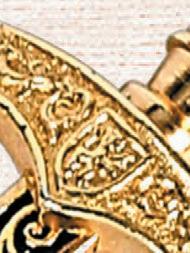


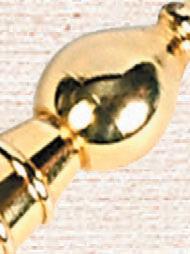
From the Muslim perspective, the Crusades were not worth noticing. That changed when 19th-century revisionists started to recast the Crusades as imperialist wars, he says. The struggle between the West and the Muslim world is not a reaction to the Crusades. That may seem a strange answer when you consider that Osama bin Laden and other Islamists often refer to Americans as "Crusaders."






They were important to Europeans because they were massive efforts that failed.







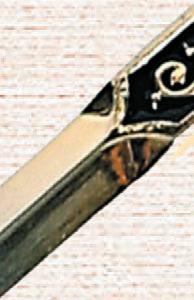

However, during the 19th century, when Europeans began conquering and colonizing Middle Eastern countries, many historians - in particular nationalist or royalist French writers - began to cast the Crusades as Europe's first attempt to bring the fruits of Western civilization to the backward Muslim world. In other words, the Crusades were
people in the Middle East have long memories; it is true. But in the case of the Crusades, they have a recovered memory: one that was manufactured for them by their European conquerors.
There are virtually no similarities between the Crusades and the war against terror today, aside from the fact that soldiers in both wars want to serve something greater than themselves that they hold dear and long to return home when it is over. Motivations in a post-Enlightenment secular society are very different from those in the medieval world.
The Crusades are different from Islam's jihad, or other wars of religion.
The fundamental purpose of jihad was to expand the Dar alIslam - the Abode of Islam - into the Dar al-Harb - the Abode of
War. In other words, jihad was expansionist, seeking to conquer nonMuslims and place them under Muslim rule. Those who were conquered were given a simple choice. For those who were not People of the Book Christians or Jews the choice was to convert to Islam or die. For those who were People of the Book, the choice was to submit to Muslim rule and Islamic law or die. The expansion of Islam, therefore, was directly linked to the military successes of jihad.
The Crusades were something very different. From its beginnings Christianity has always forbidden coerced conversion of any kind. Conversion by the sword, therefore, was not possible for Christianity.
Unlike jihad, the purpose of the Crusades was neither to expand the Christian world nor to expand Christianity through forced conversions.
Instead, the Crusades were a direct and belated response to centuries of Muslim conquests of Christian lands. The immediate event that sparked the First Crusade was the Turkish conquest of all of Asia Minor in the 1070s through 1090s.
The First Crusade was called by Pope Urban II in 1095 in response to an urgent plea for help from the Byzantine emperor in Constantinople. Pope Urban called the knights of



Christendom to come to the aid of their Eastern brethren. Asia Minor was Christian. Part of the Byzantine Empire, it had been first evangelized by St. Paul. St. Peter had been the first bishop of Antioch. Paul had written his famous letter to the Christians of Ephesus. The creed of the Church was penned at Nicaea. All of these were in Asia Minor.
Instead, the Crusades were a direct and belated response to centuries of Muslim conquests of Christian lands. The immediate event that sparked the First Crusade was the Turkish conquest of all of Asia Minor in the 1070s through 1090s.
The Byzantine emperor begged the Christians of the West for aid in recapturing these lands and expelling the Turks. The Crusades were that aid. Their purpose, though, was not only to reconquer Asia Minor but also to recapture other formerly Christian lands that had been lost due to Islamic jihads. This included the Holy Land.
In a nutshell, therefore, the major difference between Crusade and jihad is that the former was a defence against the latter. The entire history of the Eastern Crusades is one of response to Muslim aggression. The Crusaders did not convert the Muslim world. In the 13th cen-
tury some Franciscans began a mission in the Middle East to seek to convert Muslims. It was not successful, largely because Islamic law makes conversion to another religion a capital offence. This attempt, though, was separate from the Crusades, which had nothing at all to do with conversion. And it was by peaceful persuasion. Christendom rationalized its defeat in the Crusades the same way that the Jews of the Old Testament did. God withheld victory from his people because they were sinful. This led to a largescale piety movement in Europe, whose aim was to purify Christian society in every way.
The most recent myth is that Pope John Paul II apologized for the Crusades and condemned them.
This is an odd myth, because the Pope was roundly criticized for failing to apologize directly for the Crusades when he asked forgiveness from all those that Christians had unjustly harmed.
Our Holy Father did not condemn the Crusades, nor did he apologize for them. He apologized for the sins of Catholics. More recently it was widely reported that John Paul II apologized to the patriarch of Constantinople for the Crusader conquest of Constantinople in 1204.
In truth, though, the Pope only reiterated what his predecessor Pope Innocent III [1198-1216] said. That too was a tragic misfire that Innocent had done everything he could to avoid. He apologized for the sins of Catholics who took part in the Crusades. Yet he did not apologize for the Crusades themselves or even the outcome of the Crusades.
i say, i say
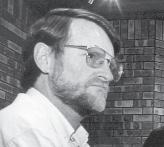 ■ By Terry Quinn
■ By Terry Quinn
“Iwas only seventeen years of age. My country, Vietnam, was at a moment of great difficulty. In many ways it had lost its way. Japan and Europe were shaken at the end of the war. Communism was making inroads. I was a young member of a small group of Catholics in the Imperial City of Hue. We were fortunate to have texts of the social encyclicals such as Rerum Novarum, Quadragesimo Anno and Divini Redemptoris. In the face of great difficulties, we reproduced them as best we could… We all need this teaching.” (Cardinal Van Thuan in the Jubilee Year 2000 ).
The late Francis-Xavier Nguyen Cardinal Van Thuan would have been a very happy man on October 25 when a landmark Catholic publication, “The Compendium of the Social Doctrine of the Church”, was published and released at the Vatican. Cardinal Van Thuan, who died in 2002, was the President of the Vatican-based Pontifical Council for Justice and Peace. His deepest desire was to publish this compendium in time for the Jubilee Year 2000. However, because of the comprehensive and complex nature of modern Catholic social teaching the project was delayed.
Yet it seems that Pope John Paul himself also shared Cardinal Van Thuan’s longing to have it published as soon as possible. I am told that when the Cardinal spoke with the Pope about necessary delays in publication and asked for more time, John Paul replied, “Fa bene, ma presto”. An Australian may translate this, “Ok but shake a leg”.
Catholic social teaching is a ‘salutary doctrine’ (Ecclesiam Suam, 55), it has the courage to take seriously the genuine questing of the secular world and it gives careful consideration to all that it has to say.
The Compendium is a 524 page handbook of teaching drawing on over a century of letters and speeches by popes from Leo XIII to John Paul II. It consists of an introduction, three parts and a conclusion. Part One deals with the nature of Catholic social teaching, ‘the fundamental presuppositions of social doctrine’.
Part Two deals with the content of catholic social teaching – including the human person, the family,
work, the economy, politics, peace and ecology. Part Three is a series of suggested actions based on the social teaching for the use of all kinds of groups both within the Church and beyond it.
The Compendium is an impressive resource for all kinds of people in leadership whether or not they are Catholics. It will be informative and useful for people in business, education and other professions; those in politics, religion, scientific research and, perhaps most important of all, valuable for families and local communities such as parishes. We now have a threefold source of teaching and ideas available to every library, parish and family: the Bible, the Catechism of the Catholic Church and The Compendium of the Social Doctrine of the Church.
Renato Cardinal Martino, current President of the Pontifical Council for Justice and Peace and a former Vatican envoy to the United Nations, said that the Compendium
Those who know their Hamlet well will recognise the title above as Hamlet’s famous last words as he dies after the duel with Laertes. Although Hamlet is describing the act of death when all human communication is suddenly at an end, the words have come to have a wider context, being often quoted when there is no more to be said upon some subject of dispute.
For me the words also have a reverse meaning, that silence is rest, the most therapeutic form of rest, or, as the Swiss inscription has it, Schweigen ist golden – Silence is golden. Great writers and especially poets have always praised the importance of silence. Gerard Manley Hopkins exhorted, ‘Elected silence sing to me, and beat upon my whorlèd ear’. Hopkins, whose poems are sprinkled with obscure, often obsolete but beautiful words, uses ‘whorlèd’ dating from the 15th century, to mean spiral, like the inside of a shell. And we can see that whorlèd is exactly right if we remember the sectional drawing of the inside of the ear. Hopkins finishes the verse, ‘Pipe me to pastures still and be the music that I care to hear.’ He knew, from his Jesuit training, just how important silence was to the development of the spiritual life.
All monastic orders have, to a greater or lesser degree, prescribed long periods of silence as an aid to contemplation of the Divine. The Carthusians and Cistertians live their lives in almost complete silence, and the Benedictines and others observe the ‘great silence’ from Compline in the evening until after Mass the next day. In the old Rite Latin Mass the most sacred prayers of the Canon were always said silently by the priest, silence broken only by the sound of the Consecration bell. In the modern Mass, sadly, there are no prescribed periods for silent contemplation, perhaps indicative of our lives which are assaulted by noise
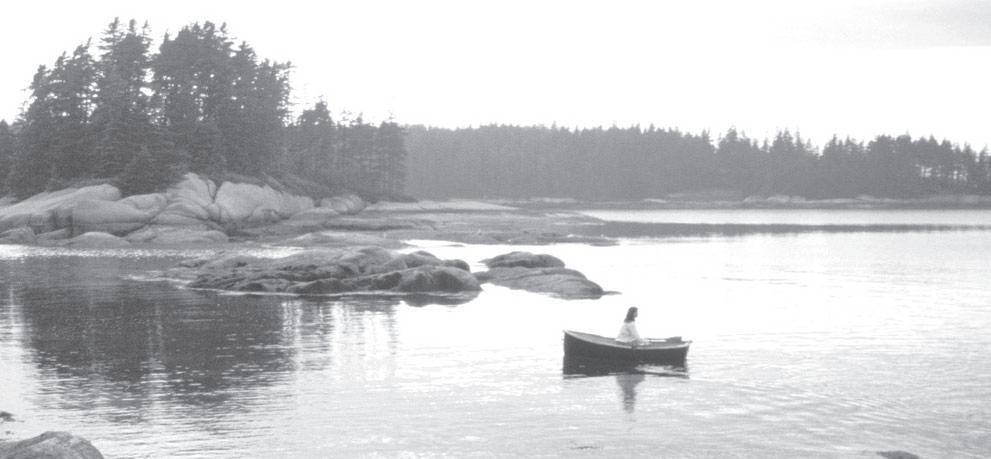
continuously throughout the day. In most churches it is useless arriving early to say preparation prayers, or staying behind for a quiet thanksgiving because the noise of chattering before Mass begins again as the priest leaves the altar.
Public libraries used to be places where people could browse and choose their books in silence, and perhaps study. The strict silence in libraries was often the subject of cartoons depicting an angry librarian remonstrating with a borrower who had inadvertently sneezed or laughed loudly at something he or she was reading. Our local library is as noisy as a marketplace and it is often the librarians themselves who are chattering the most, or calling to their colleagues across the shelves.
Silence is still strictly enforced in Archival or Special Collections libraries because it is well recognised that useful study of important texts demands concentration free from distraction. Which, perhaps, proves the point that silence, wherever it is practised, is necessary for success when undertaking mental work.
And what of the therapeutic value of silence? The sick room and wards in hospitals were, in the not so distant past, free of noise. But in public wards in today’s hospi-
tals that peace – so necessary for recovery – is almost impossible to obtain. Television sets over-hang beds and are tuned to different channels switched on at an early hour. Visitors are no longer confined to set visiting hours and jolly social gatherings around less ill patients are common; all that is missing is the barbecue.
Doctors and nurses no longer attempt to move about silently; corridors are highways where traffic, babble, and the rattle of trolleys provide a constant distraction throughout the day, and often at night. Florence Nightingale, in her monumental Notes on Nursing, published in 1898, - one time the foundation of nurse training - emphasises how important peace and quiet are in the treatment of patients. ‘Unnecessary noise that creates an expectation in the mind is that which hurts a patient’ she writes, ‘- the effect upon the ear itself appears to affect the sick.’ She instanced a case in which a patient actually died as a result of sudden noise.
Noise is part of our daily lives, impossible to avoid – ranging from distant traffic, street sounds and chatter, and the smooth hum of this computer I am using, right through the spectrum to radios blaring forth talk-back and pop music in shops, passing cars, and
was ‘an instrument for the moral and pastoral discernment of the complex events that mark our time’. Indeed, it will be helpful in the cultural, ethical and pastoral challenges which the Church today faces. The document stands between the excesses of fundamentalist secularism and fundamentalist religion. In the words of Pope Paul VI, Catholic social teaching is a ‘salutary doctrine’ (Ecclesiam Suam, 55), it has the courage to take seriously the genuine questing of the secular world and it gives careful consideration to all that it has to say. Yet Catholic social teaching always leads us deeper into the presence of Christ there to be reassured yet again that, as Catholics, we have much to contribute to the world and that we are ‘never to be without God’s marvellous support’ (Ecclesian Suam, 37).
Terry Quinn is the Executive Officer of the Catholic Social Justice Council.
musak on hold when making a telephone call to a firm or a public utility. So ubiquitous is noise that many people would find complete silence strange and unnerving. Complete silence, for those unused to it, can be too challenging. Silence requires that we exercise our minds and entertain ourselves with our own thoughts, with prayers perhaps, and listen to voices in our heads. How rare and yet how golden, how healing, is silence when we manage to find it.
One place to find silence is in those churches (an increasing number) that have introduced perpetual adoration of the Blessed Sacrament exposed. Even there, in some churches, lay members of the congregation insist on leading prayers aloud. To my mind, an unnecessary and distracting addition. Silence before the Blessed Sacrament is too precious to be interrupted.
Which reminds me of the old story about Bert, a simple, uneducated labourer who regularly visited the Blessed Sacrament for long periods. His parish priest was curious to know how he passed the time because the priest knew the man well and knew that he could hardly remember the Our Father. One day the priest questioned him as he came out of the church, asking him what prayers he said while sitting before the Blessed Sacrament. The man replied: ‘Oh, Father, I don’t say no prayers.’ ‘What do you do all that time then, Bert?” ‘Oh, Father, ‘e just looks at me, and I just looks at ‘im’ Bert, of course, whether a fictional character or whether he really existed, would surely have sat in the luxury of a healing silence where the spoken word is unnecessary and communication is in the depths of the mind.
Shakespeare, in one his sonnets speaks of the ‘sweet sessions of silent thought’ and this presupposes that conditions are conducive to silent thought, impossible amid the hustle and bustle of a normal day. Silent thought requires silence. Silence is rest.
In spite of the limited media coverage of Monday’s publication of the Compendium of the Social Doctrine of the Church, the event was an important moment. The compendium gathers, for the first time in the Church’s history, magisterial teachings on social issues.
The introduction of the volume explains that the text is intended to be “an instrument for the moral and pastoral discernment of the complex events that mark our time” (No. 10). It is intended to help inspire the attitudes and choices of individuals and organisations in a way that will enable them to “look at the future with greater trust and hope.”
The text starts by explaining the basis for the Church’s interest in social matters. At the dawn of the third millennium, the Church continues to preach the name of Christ as the way of salvation.
Such salvation is not only achieved in the new life after death, “but it also permeates this world in the realities of the economy and labour, of technology and communications, of society and politics, of the international community and the relations among cultures and peoples,” the compendium says in part No. 1.
The salvation offered by Christ is of the whole person in all dimensions, personal, social, spiritual and corporeal. This salvation is also universal. Thus, there is a link “between the relationship that the person is called to have with God and the responsibility he has towards his neighbour in the concrete circumstances of history” (No. 40).
Fundamental orientations
The opening section of the compendium deals with a number of underlying themes that are at the foundation of Catholic social

teaching. For a start the text points out that efforts in social matters are not just motivated by mere philanthropic concerns or political interests. “Discovering that they are loved by God, people come to understand their own transcendent dignity, they learn not to be satisfied with only themselves but to encounter their neighbour in a network of relationships that are ever more authentically human” (No. 4).
“The Christian love that should transform human relations spurs people on to take an interest in the problems of those around them, the text states. This love has its source in the Trinity, and it was love that inspired Jesus’ ministry. The commandment of love contained in the Gospels “must inspire, purify and elevate all human relationships in society and in politics” (No. 33).
Another important spiritual foundation of social action is overcoming sin through a transformation of the human person. Personal and social life, notes No. 41, is threatened by sin, but Christ gave us an example we can follow. Transforming ourselves by following the model given to humanity by Christ “is the necessary prerequisite” for transforming our rela-
tionships with others (No. 41).
Finding the correct balance between spiritual and temporal realities is another theme addressed in the first part of the compendium. The text, in No. 45, quotes the Second Vatican Council constitution “Gaudium et Spes” which acknowledges the autonomy of earthly affairs in their own laws and values. At the same time, this autonomy should not lead us to think that creation can be used without any reference whatsoever to God.
If mankind insists on reducing itself to an exclusively earthly vision, this refusal of transcendence will lead to an alienation that will also damage the solidarity between people, notes the compendium, citing John Paul II’s encyclical “Centesimus Annus.”
Religion and politics
Establishing the correct view of what the Church’s role is in social matters is another of the opening points dealt with by the compendium. The Church is serving the Kingdom of God through the proclamation of the Gospel values. However, “this temporal dimension of the Kingdom remains incomplete unless it is related to
the Kingdom of Christ present in the Church and straining towards eschatological fullness” (No. 50).
Therefore, the Church must not be confused with a political community and it is not bound to any political system. “Indeed, it can be affirmed that the distinction between religion and politics and the principle of religious freedom constitute a specific achievement of Christianity and one of its fundamental historical and cultural contributions” (No. 50).
The coming of the Kingdom of God, explains the following number, cannot be found in a particular social, political or economic organization. “Rather, it is seen in the development of a human social sense which for mankind is a leaven for attaining wholeness, justice and solidarity in openness to the Transcendent as a point of reference for one’s own personal definitive fulfilment.”
Within the mission
The Church is involved in social matters as part of its role in sharing the joys and hopes, anxieties and sadness of men and women of every place and time (No. 60). In this context the Church seeks to proclaim the Gospel because society is not just a worldly reality, but made up of men and women who are the way of the Church (No. 62).
This concern for social matters does not mean the Church is straying from its mission. The redemption which is part of the saving mission of the Church is certainly of the supernatural order, notes the compendium. However, the supernatural is not something that begins where the natural ends, but is a raising of the natural to a higher plane. “In this way nothing of the created or the human order is foreign to or excluded from the supernatural or theological order of faith or grace, rather it is found within it, taken on and elevated by it” (No. 64).
Therefore, notes No. 66, social doctrine forms an integral part of the Church’s evangelisation. In fact, the plan of redemption touches questions of justice and charity.
However, there are limits to social doctrine. The Church, notes No. 68, does not intervene in “technical questions,” nor does it propose systems or models of social organisation.
The compendium also defends the Church’s right to proclaim its teaching on social matters. This proclamation is part of the role of the Church as a teacher and the truths in its content stem from human nature itself and from the Gospel. The Church has a right, and a duty, to proclaim “the liberating word of the Gospel” (No. 70), to the world.
A work in progress
The compendium observes that the Church’s social doctrine has gradually been formed over time, through a series of statements on diverse issues. This helps to understand that over time some changes have taken place regarding its nature and structure.
This process is still under way.
In No. 86 the compendium refers to social doctrine as a “work site,” in which “perennial truth penetrates and permeates new circumstances, indicating paths of justice and peace.”
But this teaching cannot be reduced to a socio-economic level. Social doctrine is theological in nature and has its foundation in biblical Revelation and in the Tradition of the Church (Nos. 72-4). In this sense faith interacts with reason in a process whereby “the mystery of Christ illuminates the mystery of man” (No. 75). Along with Revelation and Tradition, social doctrine is also enriched by philosophy and the social sciences.
In his presentation of the compendium last Monday, Cardinal Renato Martino, president of the Pontifical Council for Justice and Peace, stated that the document “is now made available to all -Catholics, other Christians, people of good will -- who seek sure signs of truth in order to better promote the social good of persons and societies.” A task more necessary than ever.
‘People returning with great enthusiasm to the Eucharist’
Continued from page 4
Blessed Eucharist at other times as well. All of this flows into the celebration of Sunday Mass when we keenly sense not only our unity with Christ but our unity with one another in him. Where care is taken to fulfil the requirements for the celebration of the Sacred Liturgy the spirit of communion with Christ and with one another is deepened. The truth of the opening words of the Encyclical "Ecclesia de Eucharistia" is fulfilled at Sunday Mass: "The Church draws her life from the Eucharist", and again: "The Church was born of the paschal mystery". (No 3). The constitutive effect of the Eucharist on the Church in bringing it and holding it together, nourishing it and making it holy, forming it into the very Body of Christ, is felt week by week as the people come together to offer themselves and their lives to God, through
Christ, with him and in him.
They understand in this way that the Mass is the great act of worship of Almighty God, that they are drawn into the sacrifice of Christ that effected their salvation and that they are nourished by the Body and Blood of Christ.
It is a source of great joy that so many people receive Holy Communion each time they attend Mass, and that they prepare themselves to do so as worthily as they can.
After some years of uncertainty the people are returning with great enthusiasm to the practice of Eucharistic Adoration. In many parishes, perhaps in the majority of parishes, some hours are set aside each week for adoration. Perpetual adoration in special chapels is also increasing.
All this points to a deep love for
Jesus Christ in the Eucharist and a desire to be one with him. While secularism is making inroads to some extent, there is every reason to hope and believe that those who love for the Eucharist will recapture the hearts of those whom the secular society leaves empty.
We are mindful that Jesus offered himself to us as food and food that transforms us. The transformation that he wants is a purification of hearts and minds, a rejection of sin and of sinful attitudes, a conversion to prayer and a holy life. In brief, a transformation to love, love of God and love of neighbour.
At the institution of the Blessed Eucharist Jesus wrapped a towel around himself and washed the feet of his disciples. This startling event set within the Paschal Meal, the way in which Jesus clearly taught that the food of life, his own Body and Blood, should lead us to perform even the most humble
acts of love and service for others. Serving others in love is one of the most precious fruits of the Eucharist. If Jesus seeks to draw us into a deep communion with himself, he also wants the whole of mankind to be one with him. It is up to us to manifest his love for all peoples and to strengthen the ties of brotherhood. We cannot therefore be indifferent to the sufferings of those who are our brothers and sisters in Christ.
The Eucharist therefore urges us to look beyond our own spiritual nourishment to the plight of people who are in need. Christians, strengthened by the Eucharist, need to be in the front line in serving the poor, the homeless, the addicts, the persecuted and the rejected people of the world.
At this Eucharistic Congress, as we honour and praise our Eucharistic Lord, let us affirm our solidarity with all those who have
- ZENITbeen redeemed by the Blood of Christ. Let us commit ourselves, especially in our own regions of the world, not only to serve those in need, but to draw them into the very life of Christ. They are not simply to be the objects of charity but are to be offered the joys of knowing Christ and finding him in our Christian communities where no one will be hungry or rejected. This must be our response to Christ's call that all be one.
On 8 October 2000 the New Millennium was entrusted to the Virgin Mary. Today we renew our confident prayer that Mary will lead us to find Christ her Son in the Blessed Eucharist, so that, in union with him, empowered by him and acting in his name, we will give clear witness to the world of war and suffering that he, and he alone, is the Way, the Truth and the Life.
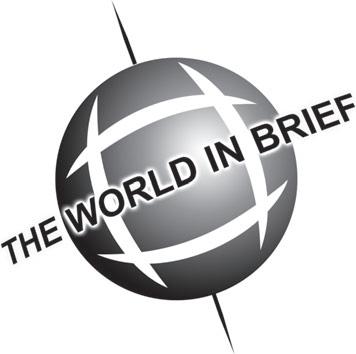
Archbishop Celestino Migliore, Vatican nuncio to the United Nations, called on November 1 for the international community to renew efforts to get Israelis and Palestinians to follow the "road map" to peace. "The reluctance of the international community to challenge the Israeli and Palestinian leaderships to negotiate in good faith has contributed to the fact that the road map has not taken off," he said at U.N. headquarters in New York. The road map was the plan designed to produce the two-state solution proposed by President George W. Bush in a 2002 speech to the United Nations. This approach, with a timetable laying out parallel steps the two sides should take, was endorsed by a "quartet" composed of the United States, the Russian Federation, the European Union and the United Nations. A Vatican statement delivered at the United Nations last year endorsed the road map and its call for a two-state solution. But this year, Archbishop Migliore noted that the plan had not brought peace, and instead the situation remains one of "ongoing violence, economic depression, restrictions on movement and lack of access to religious sites."
Canon 763
AGerman cardinal invoked canon law to prevent a dismissed French bishop from speaking in his archdiocese.
Cardinal Joachim Meisner of Cologne cited Canon 763 of the Code of Canon Law to force Bishop Jacques Gaillot to withdraw from a speaking engagement in the archdiocese.
Canon 763 allows bishops to prevent other bishops from preaching in their dioceses, “but only in particular instances and for a serious reason, for example, that the bishop is known to be preaching error or folly.”
Bishop Gaillot was removed as head of the Diocese of Evreux, France, in 1995 for opposing official church positions on issues like celibacy, women priests and the use of condoms to prevent AIDS.
Bishop Gaillot was scheduled to speak at an October 28 panel in Bonn on “Being Christian in the Third Millennium: A Faith Which Has Hope.” -CNS

The paintings by Hawaiian Catholic artist Peggy Chun show no indication of her struggles.
Chun, who for the past two years has been battling amyotrophic lateral sclerosis, also known as Lou Gehrig’s disease, paints by holding a paintbrush with her teeth.
In the face of the illness that attacks the nervous system and causes muscle cells to lose function, she has held firmly to her faith, her sense of humour and love for her friends and family.
Chun, 58, learned she had amyotrophic lateral sclerosis, or ALS, in March 2002. The news was not a complete surprise - both her mother and her twin sister, Bobby, died from it within a year of it being diagnosed. Her mother was 50, and her sister was 40.
Chun’s special weapon of defence is a well-organised group of about 100 friends, affectionately called “Peg’s Legs,” who take turns caring for her around the clock, seven days a week.
“This is what’s saving my life. It’s all these people,” Chun said. “I have double insurance and it still doesn’t cover everything, so they are saving us about $150,000 a year just by volunteering. It is amazing.”
The group was first organised by her daughter-in-law, Kimi Chun, then was taken over by a friend, Susanne Maurer.
“What Peggy is experiencing is a reflection of all the love she has given out in her adult life,” Maurer said. “She is an extrovert. She loves a party. She loves a good time. She loves laughter. This illness has not dampened that a degree.”

Forty-one volunteers help out each week, working in pairs in four-hour shifts. Nurses provide care at night.
New workers arrive apprehensive but leave grateful and happy, Maurer said. “You go to Peggy’s in hopes to be a blessing and you leave far more blessed.”
Chun, who was raised in Oklahoma in a family of eight, also gets visits from her five brothers and one sister, and her 87-year-old father comes to see her.
Chun’s home is decorated with images of St. Padre Pio
of Pietralcina, Blessed Mother
Teresa and an icon of St. Michael the Archangel. She said she prays every day and has “tried to make a lot of deals” but noted that her best prayers have been when she is thankful. Maurer is amazed at Chun’s faith and sees it as an example for others. She said her friend “lives to encourage other people that no matter how dark it seems there is hope.”
Chun’s twin sister, Bobby, painted from the 1970s until 1986, when she learned she had the disease. She died in June 1987. Six months later, Chun
picked up her paintbrush.
“I woke up with this dream of my sister and I just felt I had to take a painting class,” she said. Chun called an art school that day and took the last remaining spot in its roster of courses. She soon began selling her work and getting commissions. She became known for her whimsy - flying cows and bright Hawaiian beach scenes.
“It is just amazing to see the patterns as they fall,” she said. “I went through a very rough divorce and was left in so much debt that I had to paint,” she added. -CNS
As the Vatican was preparing the “Compendium of the Social Doctrine of the Church,” people repeatedly referred to it as the “social catechism.”
While it was designed to be a companion volume to the “Catechism of the Catholic Church,” it is not a catechism, insisted Cardinal Renato Martino, president of the Pontifical Council for Justice and Peace, which drafted the compendium.
The catechism, while sometimes using new language or examples, presented the unchanging truths of the Catholic faith.
The compendium, on the other hand, was designed to show precisely that, while the church’s faith does not change, the issues it feels compelled to address do change because the world changes.
“The very fact that it is called a compendium and not a catechism is indicative, because the social doctrine accompanies the evolving of the world, the problems that arise. While the catechism gives an idea of something more
defined and fixed, the social doctrine can confront problems that did not even exist yesterday,” the cardinal said.
The fact that Catholic social doctrine is meant to change as new social challenges emerge should not lead Catholics to think they can ignore it and still be faithful Catholics, council officials said.
The church’s social doctrine is part of the moral teaching of the church, and the Congregation for the Doctrine of the Faith reviewed the compendium prior to its publication.
“There is nothing in it that has not been said by the Popes. We are not advancing hypotheses or doctrinal teachings that are not official and public,” Cardinal Martino said.
That the Catholic Church has tried to deal with the complications of living a moral life in the modern world is demonstrated in the 331 pages of the English text’s treatment of topics, including the environment, war, politics, the family, business, workers’ rights and private property.
While the text repeated the Catholic Church’s absolute “no” to legalised abortion and to gay marriages, it basically gave a “not a
good idea” to capital punishment and to “preventative war,” a war unleashed to prevent a possible attack when attack is not imminent and there is no clear support from the United Nations.
Bishop Giampaolo Crepaldi, secretary of the justice and peace council and main editor of the compendium, said it is important to realise that, as the compendium said, Catholic social teaching does not speak only to the segment of the church that wants to specialize in issues of peace, justice, economics or politics.
Catholic social teaching “is the expression of the way that the church understands society and of her position regarding social structures and changes,” it said.
Bishop Crepaldi said local bishops’ conferences have a specific responsibility to take the teachings and apply them to the concrete situations they find in their countries.
The volume was published on October 25 to coincide with the opening of the justice and peace council’s plenary meeting and its first convocation of Catholic justice and peace groups from around the world.
The Vatican has renewed its effort to get the United Nations to develop an international convention that would ban all forms of human cloning.
Speaking on October 21 to a committee of the U.N. General Assembly assigned to consider the issue, the Vatican’s U.N. nuncio said both reproductive and therapeutic cloning “involve disrespect for the dignity of the human being.”
Therapeutic cloning, carried out for research purposes in the hope of finding cures for many diseases, means “creating human embryos with the intention of destroying them,” and this process, even if done with good intentions, has the result of “making one human life nothing more than the instrument of another,” said Archbishop Celestino Migliore.
A resolution sponsored by Costa Rica and supported by the United States and many other countries asks the General Assembly to appoint a committee to prepare a draft text of a convention against all human cloning.
But another resolution, sponsored by Belgium and supported by a number of European and other countries, calls for development of a convention that would prohibit only reproductive cloning.
Backers of this resolution argue that, while the world is divided over therapeutic cloning, a consensus against reproductive cloning already exists, and the United Nations could and should move quickly to produce a convention against it.
But since the proposal for a convention against reproductive cloning first emerged at the United Nations in 2001, the Vatican has pushed strongly for a ban on all human cloning.
In this year’s debate in the General Assembly committee, Archbishop Migliore said the distinction drawn between the two types “seems specious.”
“Both involve the same technical cloning process and differ only in goal,” he said.
The nuncio also reiterated the Vatican argument that progress toward the goals of therapeutic cloning have already been achieved through use of “socalled adult stem cells, namely stem cells from bone marrow, cord blood and other mature tissues.”
Archbishop Migliore said the Vatican is not opposed to “scientific progress.”
“Rather, we would say that the choice is not between science and ethics, but between science that is ethically responsible and science that is not,” he said.
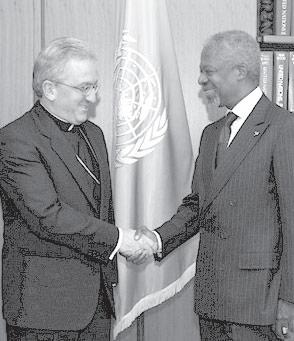
Some speakers argued that a ban on reproductive cloning would leave individual nations free to outlaw therapeutic cloning in their own territories if they wished.
Archbishop Migliore said the
Vatican is not
opposed to “scientific progress.”
Reproductive cloning is often defined as “the replication of a human individual by cultivating a cell with genetic material through the egg, embryo, fetal and newborn stages into a new human individual.”
But Archbishop Migliore said the U.N. General Assembly was the proper place to deal with the questions involved.
“The subject of this particular scientific pursuit concerns the nature and existence of human life itself,” he said. “Therefore a body that is supranational has the proper scope to encompass the full breadth of this issue.”
Vatican officials have identified the cloning issue as one of the most crucial facing the international community, and have devoted special attention to it.
On September 27, the Vatican issued a document on the subject, declaring support for biomedical research but insisting that “any research that is inconsistent with the dignity of the human being is morally excluded.”
“The Holy See opposes the cloning of human embryos for the purpose of destroying them in order to harvest their stem cells, even for a noble purpose,”

The Vatican’s U.N. nuncio called for the international community to recognise that religious freedom includes the right of religious groups to participate in public life as well as the right of individuals to freedom of conscience.
“The attitude of those who would like to confine religious expression to the merely private sphere ignores and denies the nature of authentic religious convictions,” said Archbishop Celestino Migliore.
Legal structures ought to “foster the contribution of believers to the common good of society” rather than seek to restrict it, he said.
The nuncio made his comments in a statement to a committee of the U.N. General Assembly reviewing questions of human rights.
Religious groups ought to be allowed to work in social, educational and humanitarian fields, and to do so while remaining religiously distinct, he said. He said enabling them to operate in an openly religious way would enrich “a genuine culture of pluralism” and provide much needed services to the poor, the vulnerable and the needy.

A nun in a traditional dress, an important aspect of religious freed om. Photo: CNS/Reuters
affairs of religious institutions would undermine their raison d’etre,” he said.
While emphasising the importance and comprehensive nature of religious freedom, Archbishop Migliore also said religious leaders have a special responsibility to prevent “any misuse or misrepresentation of religious beliefs and freedom.”
He said they are “called to create and spread a sensitivity” that would “never turn to acts of terror” but would “reject and condemn such acts as a profanation of religion.”
the Vatican said, because “it is inconsistent” with the “motive of biomedical research, that is, respect for the dignity of human beings.”
Archbishop Migliore had this paper circulated to U.N. members on October 7 as a General Assembly document, using a new privilege secured through a resolution that was adopted by the General Assembly on July 1 to establish a firmer base for the permanent observer status of the Vatican.
In the debate, the paper drew a sharp critique from the representative of Singapore, Vanu Gopala Menon, who argued that therapeutic cloning should be allowed.
Not identifying the source, he said the paper was “circulated by a particular delegation” but said it summed up the approach of the countries trying to ban all human cloning. His delegation had studied it “very attentively,” he added.
He took particular exception to one sentence in the Vatican document: “Honesty suggests that if one specific course of research has already demonstrated conditions for success and raises no ethical questions, it should be pursued before embarking on another that has shown little prospect of success and raises ethical concerns.”
Singapore avoids accusations that the other side is “less than honest,” Menon commented, but might as legitimately say honesty suggests the United Nations should move ahead where there is a consensus before pursuing a divisive proposal to ban therapeutic cloning. -CNS
But “attempts to secularise or to interfere in the internal
But Archbishop Migliore concluded by telling the international community that the Vatican would continue to defend religious freedom vigorously. -CNS
The relics of St. Augustine will be in Rome for the 1,650th anniversary celebrations of his birth.
The relics of the bishop of Hippo will be in the basilica dedicated to him in the Campo Marzio, and also in the Vatican.
Augustine was born on November 13, 354, in what is now Algeria. He is considered one of the greatest thinkers of all times. After a doctrinally and morally dissolute youth, he converted while living in Milan and in 387 was baptized by the Bishop, St. Ambrose.
It is anticipated that for one night during that week, the urn containing St. Augustine’s relics will be in John Paul II’s private chapel.
Having returned to his homeland, he was elected bishop of Hippo. Over the 34 years in which he exercised his ministry, he was a model to his faithful, to whom he imparted a solid formation with his sermons and numerous writings, contributing to a more profound understanding of the Christian faith in response to the doctrinal errors of his time.
Augustine is numbered among
the most influential Fathers of the West. His writings, such as his “Confessions,” remain timely. He died in 430. John Paul II spoke of the timeliness of St. Augustine’s writings three years ago, describing him as a unique teacher for modern man who seeks God tentatively.
“Augustine’s experience is similar to that of many contemporaries,” he said on Sept. 7, 2001, when receiving the participants in the general chapter of the Augustinian order.
Rome will observe the anniversary of the birth of this Doctor of the Church with celebrations, congresses and exhibitions from November 7-15, the Italian newspaper Avvenire confirmed.
It is anticipated that for one night during that week, the urn containing St. Augustine’s relics will be in John Paul II’s private chapel, as a sign of devotion and of the importance that the Holy Father accords to the thought of the saint of Tagaste, whom he has often quoted in the texts of his magisterium.
A restless man, “Doctor of Grace” and Father of the interior life, St. Augustine has thoroughly influenced Western culture. A rereading of his works shows how timely he is. This conviction has led the Italian Augustinian Province and St. Augustine’s order to organize a week of celebrations under the motto “St. Augustine Among Us.” -ZENIT
It takes one to know one: Agnostic meets hedonist.
Joseph Pearce, a man with a past, looks at the scandalous Oscar Wilde’s fall and rise - and sees a truly Catholic writer
As a young man in East London, Joseph Pearce was a skinhead and radical activist who edited two politically extreme, racist magazines.
Today, more than 20 years later, he is an acclaimed biographer whose latest work, “The Unmasking of Oscar Wilde” (Ignatius, $19.95), seeks to set the record straight about the famous English writer and wit.
The dramatic transformation from angry agnostic to devout Catholic was neither quick nor easy for Pearce, who is also a writer in-residence and professor at Ave Maria University in Naples, Florida. Raised in an anti-Catholic home with nominal Protestant roots, as a teen in the 1970s he embraced neo-fascism and white supremacy.
A voracious reader and gifted writer, Pearce edited magazines for the radical right-wing group National Front. He soon found himself in prison. Convinced that there had to be a just alternative to both capitalism and Marxism, Pearce came across a book titled “The Well and the Shallows.” The author? The rotund and
movie brief
Absorbing, if not quite top-drawer, thriller about a mother (Julianne Moore)
grieving for the son killed in a plane crash, who is told that the boy never existed in the first place, prompting her to join forces with a retired hockey player

renowned Catholic apologist G. K. Chesterton. Initially attracted to Chesterton’s advocacy of distributism - an economic system based on private ownership, agrarianism and the equitable distribution of goods and services Pearce was soon examining Chesterton’s arguments for the Catholic faith.“I began to embrace Chesterton’s philosophy of gratitude, and I fell in love with his personality and spirit,” he said.
While serving a second prison sentence in 1985, when asked by prison officials what his religious affiliation was, Pearce said Catholic, even though he wasn’t. Looking back, he sees a strong parallel between his experience and that of Wilde.
“That Wilde finally came to conversion in prison is something that is very powerful to me” Pearce told Our Sunday Visitor, “because that is what happened to me. It was while I was in prison that I finally converted. It’s where I first began to pray, to say the Rosary, to go to Mass and to think of myself as Catholic.”
Pearce was finally received into the Catholic Church at Our Lady, Mother of God in Norfolk, England, in 1989.
His love for Chesterton and his writing inspired Pearce to pen “Wisdom and Innocence: A Life of G. K. Chesterton.’ Some reviews in secular newspapers were less than kind, but scholars such as Aidan Mackey of the Chesterton Study Centre said it was the finest biography of
(Dominic West), whose daughter allegedly perished with her son, and solve the mystery. Good performances, some genuine chills and tight -- if formulaic -- direction by Joseph Ruben in the Shyamalan mode. Some rough language and profanity, and a few intensely jolting moments. The USCCB Office for Film & Broadcasting classification is A-III - - adults. - CNS
Chesterton in the past 50 years. Pearce is not bothered by the negative reviews. He has his own words of criticism for many biographies that are written today.
“ There are three kinds of biography,” he explained. “There is hagiography, which covers up all the subject’s warts. Then, there is what I call’ ‘hackiography’, which hacks to pieces the subject and is written by hacks. But the true biographer approaches the subject with humility and is at the service of objective truth, not his personal agenda. He lets the facts speak for themselves so people can see for themselves and check the facts for themselves.”
Pearce’s other writings include biographies of J.R.R. Tolkien, Alexander Solzhenitsyn and Hilaire Belloc; and “Literary Converts,” which combines biography and literary history to illuminate the lives of several Catholic and Anglo-Catholic writers. Pearce’s biography of Wilde was written, in part, to destroy the misconception that Wilde was a homosexual martyr. “I’m very motivated by the provocations of errors in recent biographies of Wilde,” he said. “Wilde’s work is being judged by the man, not the man by his work. All the things he was detested for in Victorian society - homosexuality, debauchery and hedonism - have become the things he is idolized for in our day,” he said. He has become a ‘gay icon.’ “This portrayal is unfair, Pearce said, because “Wilde had a lifelong love affair with the Catholic Church. His art is always overtly moral, and the morality is overtly Catholic in nature. He is a timeless Christian writer.”
Chesterton was “a saint” and easy to write about, he said, Wilde was a more difficult subject.
“Because of my background, having been to prison twice as a young man in East London, I’ve found it moving and edifying to get inside the head and heart of Oscar Wilde, a more enigmatic character. It’s more satisfying in some ways. It’s the Mary Magdalene path to Christ, and I’m attracted to it - it’s the path I came on.”
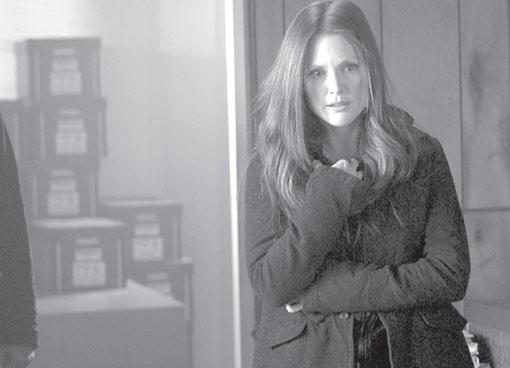
Written with sensitivity, Forbidden Grief - The Unspoken Pain of Abortion is highly recommended by the Abortion Grief Counselling Association for all those interested in better understanding the pain and issues surrounding abortion trauma - an emerging, unrecognised trauma that is in epidemic proportions in our communities.
Abortion causes conflict. It fragments political parties, churches, schools and neighbourhoods. It divides families. Husband against wife. Mother against daughter. Sister against sister.These conflicts reflect the discord that also occurs within individuals. After abortion, many women face the daily internal battle between condemning and defending themselves.
Psychotherapist Theresa Burke, PhD, has specialised in treating women struggling with post-abortion issues through individual counselling and group therapy sessions since 1986.
Many of the women she treated had been rebuffed by other therapists who would not believe their abortions had caused such trauma. Others came to her because their family and friends refused to acknowledge the reality of their grief.
Drawing on the experience and insights of hundreds of her clients Dr Burke shows how repressed feelings may be acted out through selfdestructive behaviour, broken relationships, obsessions, eating disorders, parental difficulties, and
Uneven comedy about a successful Chicago ad man (Ben Affleck) who, tired of spending Christmas alone, pays the family living in his childhood house (headed by James Gandolfini) a small fortune to “adopt” him for the holiday season, so he can relive the idyllic Christmases of his youth. Directed by Mike Mitchell, the film’s screwball humor is a mixed bag of “naughty” and “nice,” making this yuletide yukfest hardly the kind of family-friendly entertainment it could have been. Fleeting erotic images on a computer screen, brief comic violence, a drug reference and some crude language and humor. The USCCB Office for Film & Broadcasting classification is AIII -- adults.
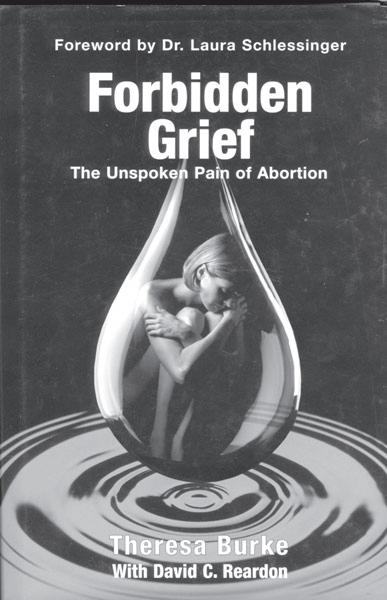
other emotional or behavioural problems. Most interesting, is the chapter on The Politics of Trauma where the authors place abortion trauma in its historical context.
Well summarised, this chapter shows that despite the resistance within the psychiatric community to recognising abortion trauma solid unrelenting progress is being made through the commitment and dedication of some true professionals.
Co-author David C Reardon, PhD, is among America’s foremost researchers and authors on post-abortion issues and is the founding director of the Elliot Institute. His work is considered essential reading by this Abortion Grief Counselling Association (AGCA) for all those involved in pregnancy crisis and abortion grief counselling.
Forbidden Grief is available through the Respect Life Office on 9375 2029.
Sweet but stale sequel about a young American (Anne Hathaway) who, in preparing to ascend the throne of a small European kingdom, learns that she cannot become queen until she is married.
This leaves her 30 days to find a groom before she must forfeit the crown to her royal rival, a dashing prince (Chris Pine) with whom she falls in love. As directed by Garry Marshall, the wholesometoned tale is full of Cinderella-like romance sure to enchant its targeted audience of pre-pubescent princess-wannabes, but which may make older viewers pull a Sleeping Beauty. Some thematic elements and a few brief kissing scenes.
The USCCB Office for Film & Broadcasting classification is A-I -- general patronage. - CNS
BUILDING TRADES
BRICK re-pointing. Phone Nigel 9242 2952
ELECTRICIAN, Power/ light points from $50 each. Rewiring our speciality. 0418 941 286, 9279 5008.
PERROTT PAINTING Pty
Ltd for all your residential, commercial painting requirements. Phone Tom Perrott 9444 1200.
PICASSO Painting. Top service. Phone 9345 0557, fax 9345 0505.
MAN, Catholic 79 active, simple lifestyle ns/nd Irish background, travelled, enjoys walking, reading, exercise. Seeks active Caucasian widow around 70, similar, possible marriage. Reply: PO Box 533, Gosnells.
Sunday November 7 ETERNAL WORD TELEVISION NETWORK
1 - 2pm on Access 31: Web of Faith: Fr Robert Levis and Fr John Trigilio answer email questions sent by viewers. We apologise that it was not possible for the program advertised last week to be broadcast, due to a technical difficulty. Please help us to evangelise by sending donations to the Rosary Christian Tutorial Association, PO Box 1270, Booragoon 6954. Phone enquires concerning programs or videos: 9330 1170.
Sunday November 7
GATE OF HEAVEN
FURNITURE REMOVAL
200 Catholic Worship Hymn Books $200, set of hand carved timber Stations of the Cross traditional 14 plus extra, approx 60cm x 60cm $500. Contact Fr Bigoni ,or John Calleja, St Josephs Parish Bassendean 9279 1549.
BIBLES , Books, CD’s, Cards, gifts, Statues, Baptism & Communion Apparel, Albs, Vestments and much more. RICH HARVEST, 39 Hulme Court, Myaree, 9329 9889 after 10.30am.
THANK YOU
THANK YOU Mother of Mary for the granting of my prayers. 3 x Mother Mary’s Novena and Sacred Heart of Jesus. VS
DENMARK beautiful 3brm, 2bth, cott, fully equip, special rates. Ph: 0412 083 377
URGENT Pregnancy Assistance requires volunteer drivers to pick up and deliver baby furniture to all suburbs. Ph: 9328 2929
Due
Wanted: Manager/s for Epiphany Retreat Centre, Rossmoyne
The committee is seeking a live in Catholic couple (or single) for everyday management and running of this Pallottine Centre. Some experience in basic hospitality and catering would be an advantage. Accommodation supplied and small remuneration to be negotiated.
Enquiries to Denise 9354 0200. Applications
close Tuesday November 30.
Apply to: President, Epiphany Retreat Centre, 60 Fifth Avenue, Rossmoyne. 6148
Please join us this Sunday at 7:30pm on 107.9 FM, Radio Fremantle, for more Global Catholic Radio. This week we will feature:
(1) The Late Archbishop Fulton J Sheen; Death and Judgment.
(2) The Late Archbishop Fulton J Sheen; Purgatory. (3) Defending Life; Genocide Awareness Project G.A.P with Fr Frank Pavone. Donations toward the program may be sent to Gate of Heaven, PO Box 845, Claremont, WA 6910. Programs subject to change without notice.
Monday November 8
CATHOLIC MENTAL HEALTH SUPPORT GROUP
Carers meeting is held on the second Monday of each month commencing at 7.30pm at Our Lady of Lourdes Parish, Marda Way, Nollamara. These meetings provide the opportunity to share information and offer mutual support. Enq: Pat Mahoney 9275 2809.
Thursday November 11
CHARISMATIC HEALING MASS
Celebrated by Fr Hugh Thomas and organized by the Agape Praising Group will be held at Our Lady of the Rosary Parish Centre, Angelico Street, Woodlands at 7.30pm. The Mass will be followed by a Christmas Party. An invitation is extended to all those interested. Enq: Celine 9446 2147 or email knight@wa1. quik.com.au
Saturday November 13
DAY OF PRAYER FOR YOUNG MEN
Fr Hugh Thomas will lead a day of prayer and reflection for men
aged 17-50 at the Redemptorist Monastery, 190 Vincent St, North Perth from 9am – 5.30pm. Enq: 9328 6600.
Saturday November 13
HOLY HOUR FOR VOCATIONS
10am –11am at the Redemptorist Church, North Perth with Exposition of the Blessed Sacrament.
Saturday November 13
ANNUAL HOLY MASS
At the grotto of Richard & Judy Priestly’s farm will commence at 10.30am. BBQ meat will be provided. Please bring a chair and a hat. Directions: take Great Eastern Hway to El Cabello Blanco & turn south into Warin Rd & go 1.8km & turn left into Chinganning Rd & go 2.2km. Enq: 9450 2749.
Wednesday November 17
HILLS AND EASTERN REGION MENTAL HEALTH
The next Support Group meeting will be at Our Lady of Lourdes Parish Centre, 207 Lesmurdie Rd, Lesmurdie, at 7.30pm. Mr Michael Innes from Daysprings Christian Ministry and from the Office of Public Advocate at the Ministry of Justice will be the guest speaker. Afterwards, Michael Innes is prepared to answer any questions. Michael, works in Christian Ministry and has a son with disabilities.
Friday November 19-21 HEALING RETREAT
The Holy Spirit of Freedom Community is presenting a Healing Retreat in Pemberton entitled, Christ the King our Healing Lord. All welcome. Enq: Meryl Giumelli 9772 1172.
Sunday November 21 FEAST OF CHRIST THE KING
St Anne’s Church, Bindoon Divine Mercy Pilgrimage. Coach departs Mercedes College Carpark
9.30am. 11.30am - 12.30pm Holy Hour, 12.30 - 1.30pm BBQ Lunch, 1.30 - 2pm Eucharistic Procession, Rosary & Benediction. 2.50 - 3pm Divine Mercy Chaplet. 34pm Holy Mass, 4 - 4.45pm VideoFr Corapi. Afternoon Tea Provided. For transport arrangements Francis 9459 3873 or John 9457 7771.
Sunday November 21 YIDARRA CATHOLIC PRIMARY SCHOOL 20TH ANNIVERSARY
As part of the anniversary
celebrations, there will be a casual get together to renew old acquaintances at a Sundowner in the undercover area at the school in Marsengo Rd Bateman between 2 and 6 pm. All community members are welcome especially ex students, staff and families. BYO everything. Enq: 9332 3011.
Saturday November 27
TERTIARY CONVENTION
The leaders of the Lay Fraternities (tertiaries, oblates and cooperators) belonging to the major Religious Orders presently in Western Australia are asked to attend a committee meeting to be held at 2pm. The meeting will be held at the Dominican Priory, Angelico Street, Doubleview to discuss the format and agenda for a grand gathering of the fraternities early next year. Enq: Adrian Briffa OPL, Phone 9446 2147 or email knight@wa1.quik.com.au
Sunday November 28 STAR OF THE SEA COTTESLOE CENTENARY
The Parish will mark its Centenary with 10am Mass celebrated by Archbishop Hickey followed by a luncheon. Past parishioners and friends are invited to participate on this occasion. Enq: Ed O'Loughlin 9384 9398.
Friday December 3-5
ANNUAL RETREAT
The Secular Franciscans of WA will hold their annual retreat at the Retreat House, North Perth. All welcome. Enq/Bookings: Michael 9444 0352 or Mary 9377 7925.
Sunday December 5 ANNUAL ROSARY PROCESSION
In honour of Our Lady of the Immaculate Conception at St Joseph’s parish church, Hamilton St Bassendean. Followed by Benediction of the Blessed Sacrament. Light refreshments in the hall afterwards. In preparation for this event a Tridiuum of Rosaries and Masses will be held on: Wednesday December 1 at 7pm, Thursday December 2 at 7pm and Friday December 3 at 7pm. Enq: Fr Bogoni 9279 1549, Colin 9279 9750, Vince 9279 4812 or Renato 9279 2163.
Sunday December 5 150TH CELEBRATIONS
The Parish of Dardanup/Boyanup
Mercedes College farm / kitchen - Archbishop Hickey 10th Anniversary Mass for Indonesian Catholic Community, St Mary’s Cathedral -
will be celebrating the 150th anniversary of the original Church of the Immaculate Conception (now known as The Thomas Little Memorial Hall). Mass in Dardanup at 10am will be celebrated by Bishop Gerard Holohan, lunch will be provided afterwards. Former parishioners and teaching staff are all invited to attend. Enq: Ward 9728 1411 (a/h).
Monday February 21 – 25
PARISH MISSIONS & WEEKEND/ DAY RETREAT
To look forward to….a focus on prayer/ meditation and its part in building faith and community. The Mission director will be Fr Justin Belitz OFM, a powerful and inspiring international speaker and writer of Success: Full Living. Mission Venues: Bunbury, St Patrick’s Cathedral Parish. February 21-25.
Contact: Dick 97214651
Morley Infant Jesus Parish. March 6-10. Contact: 9276 8500. Armadale St Francis Xavier Parish March 16.
Contact: 9399 2143. Weekend/Day
Retreat: The Power of the Inner Voice, Peace be Still, Chittering. March 18-20, day retreat March 19. Contact: Wendy 9571 8108.
Friday March 4-6
UNDER THE GREAT CROSS
An ecumenical gathering on Australian Spirituality sponsored by the Wellspring Community will take place at the Australian Centre for Christianity & Culture in Canberra. Speakers include James Haire, Rachael Kohn and Peter Newman. Enq: Jim Tulip 02 4758 8104 or email: jamestulip@bigpond.com. All welcome.
CROSS ROADS COMMUNITY
Healing Masses: 1st Monday of month 7pm Church of East Fremantle, 2nd Monday of month 10am St Jerome’s Munster. Term 4: 18th October to 17th December for: Family & Friends Support Groups of Substance Abusers on Wednesdays 7 – 9pm, Substance Abusers Support Groups on Tuesdays 5.30 – 7.30pm & Fridays All day Group for Substance Abusers on Fridays 9.30am – 2pm, Bible Night: Tuesdays 7 – 9pm & Healing Mass: Fridays 12.15pm.
Archbishop Hickey
St Charles’ Seminary End-of-Year Evening Prayer - Bishop Sproxton
13 13th Anniversary of Personal Advocacy, Chisholm College Hall - Archbishop Hickey
14 Solemn High Mass for St Rocco Association, LeedervilleArchbishop Hickey
Closing Ceremony for Women’s Cursillo Weekend, BickleyArchbishop Hickey
Confirmation, BallajuraBishop Quinn
Confirmation, Shenton Park - Fr Greg Carroll
16
Official Blessing and Opening at St Andrew’s Primary SchoolBishop Sproxton
Young adults in their 20s and 30s are often searching for their life mates, and Catholics are no different.
That's why John Van Epp's workshop on "How to Avoid Marrying a Jerk(ette)" was a popular part of the October 15-17 National Young Adult Conference, sponsored by the Cleveland diocesan Youth & Young Adult Ministry and CYO offices, the Catholic dioceses of Ohio, the US Conference of Catholic Bishops and the National Catholic Young Adult Ministry Association.
Thirteen men and 44 women got a crash course in Van Epp's five-part relationship attachment model, which he teaches to members of the US armed services and other groups. He has a video, DVD and Web site (www.nojerks.com) and even offers certification in the model.
"Choosing a marriage partner requires your heart to work in harmony with your head," Van Epp said. "The program is more than marrying a certain type of person, but rather getting to know what a person is like."
The relationship attachment model has five levels - to know, trust, rely, commit and touch. If these are out of balance, or if a person moves up to the latter levels too soon, the relationship suffers, he said. He said the Bible's term for a jerk was "fool": Fools cannot understand another's perception, have tunnel vision and can think only of themselves.
"We are made to work in harmony with our emotions," Van Epp said. "All of us can act like jerks, but the key is not to get in a relationship with someone who has no intention for change or growth."
Many people he has counseled have told him they overlooked red flags at the beginning of a dysfunctional relationship because they "fell in love." This is letting the emotions take over and not getting to know the

person first, he said. He spoke about the history of marriage. Only in the early 1900s did romantic-based relationships come about. Before then, 80 percent of marriages were arranged. He said families believed they needed to be a part of the process of choosing a spouse.
In today's individualistic society, people are under the impression they should choose their own partners, but one is not marrying a person, but a family, he said.
Family input and others' perceptions of the relationship are important, Van Epp said.
He stressed the importance of looking at the family background, conscience, compatibility, relationship skills and relationship patterns in a potential partner.
"I am going to give you a rule: Extremely significant patterns frequently stay hidden for the first three months," he said. "The first state usually lasts for the first few months.
Significant patterns do not surface for three months."
Van Epp's workshop was just one part of the conference which drew more than 400 Catholic young adults from as far away as London and Anchorage, Alaska, to Jesuitrun John Carroll University in University Heights, near Cleveland.
"I came to get some ideas, brainstorm with others who do the job (of young adult ministry), to collaborate with others about what ideas are working," said Erin Coyne, president of the Catholic Young Adult group in Erie, Pennsylvania, who teaches French and math at Erie's Cathedral Preparatory School.
Coyne attended a workshop on "Developing Young Adult Leaders" at the national conference.
"One of the things I got from the workshop was to be specific (and) explicitly state the length of time when a person comes on (to
serve on the core team). It gives them that sense, 'I'm committed,'" she said.
The conference included the sacrament of reconciliation offered by the bishops and priests. There was also a concert in Browns Stadium by a diocesan-supported band called Who Do You Say That I Am, which played dance and Latino music.
Bishops Anthony M. Pilla of Cleveland and Dennis M. Schnurr of Duluth, Minnesota, and Auxiliary Bishops Martin J. Amos and Roger W. Gries of Cleveland concelebrated Mass at Gesu Church across from John Carroll University, with Bishop Gries as homilist.
The conference concluded on October 17 with a commissioning service by Msgr. Ray East, director of the Office of Black Catholics and vicar for evangelization of the Archdiocese of Washington.
- CNSBRIAN PEACHEY enjoyed the enthusiasm and spirit of the Church in Mexico during his attendence at the recent 48th International Eucharistic Congress.
■ By
IBrian Peacheyhave seen the Church fervent and alive in Mexico at the 48 th International Eucharistic Congress. This great event could not be compared with any other because it was in Mexico. It had the colour of the Mexicans, the sound of their singing, their joyful infectious fervour and the obvious strength of their faith. Hundreds of smiling, enthusiastic young people in blue jackets welcomed us to the Congress in the Guadalajara Exhibition Building.
The youth of the Mexicans contrasted with the our delegation of 41 Australians, only six of whom were less than 60 years of age. Apart from Archbishop Hickey and Bishop Jarrett from Lismore the only Australian priest was 82-year-old Father Patrick Lane from Wangaratta.
The first session of the Congress, which included an address by Archbishop Hickey on behalf of the people of Oceania, concluded with
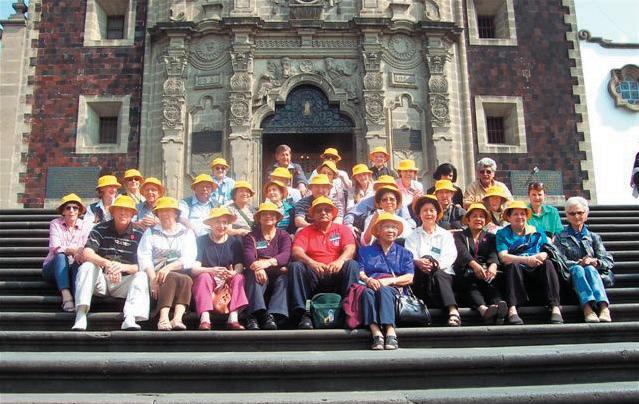
Mass in the evening in the Plaza Tapatia in front of the Institution of Culture.
The massive, mainly Mexican crowd, estimated to be more than a million, stretched back along the Avenue Morelos.
But it was during the closing Mass celebrated by the Papal Legate, Cardinal Jozef Tomko with other cardinals, bishops and priests in Jasilco Stadium, which seats 80,000, that we witnessed the devotion and enthusiasm of the Church
in Mexico. This vast congregation chanted and sang in a manner that we had never experienced. We could only clap to the rhythm and join in the rapturous cry of viva Christo re. There was an explosive roar of loyalty when the Pope appeared on the big screens in a direct telecast from the Vatican. Emotion and enthusiasm can be deceptive.
A more significant measure of the Church’s vitality is that in the Archdiocese of Guadalajara there are more than 400 seminarians in the major seminary and about 1200 candidates in several minor seminaries. After Our Lady of Guadalupe appeared to the Aztec Indian, Juan Diego in 1531 an estimated 9 million of the pagan inhabitants embraced the Church.
This was at the same time that the Church in England was lost. Almost five hundred years later when the Church of England appears to be selfdestructing the Catholic Church in Mexico is thriving.